

FUNDED & PROVIDED IN THE HEART OF NJ BY
A program of the Harold Grinspoon Foundation, PJ Library® provides Jewish children’s books, music, and learning activities to hundreds of thousands of families around the world. For more information about PJ Library’s unique mission and to sign up for PJ Library’s free monthly children’s book program, visit pjlibrary.org.
Special thanks to the Foundation’s Next Generation Advisory Board, members of the PJ Library sta , and the following people who contributed their energy and talent to create this Haggadah:
Coordination:
Rachel Fish
Yishai Amos
Illustration:
Sophia Vincent Guy

Editorial:
Sharon Forman
Elisheva Urbas
Graphic Design:
Zoe Pappenheimer
Copyright © 2021 Harold Grinspoon Foundation. All rights reserved. No part of this publication may be reproduced, distributed, or transmitted in any form or by any means without prior approval. Third edition.
ISBN: 978-1-7343450-2-5
Printed in the United States of America
HOORAY, THERE'S MORE!
For additional Passover resources to supplement this Haggadah and enhance your seder, please visit PJLIBRARY.ORG/PASSOVER
EVERY GENERATIO EVERY GENERATIO
A PJ Library INTERACTIVE
Family Haggadah
Happy Passover! We are excited to celebrate with you. Turn the page to get started.

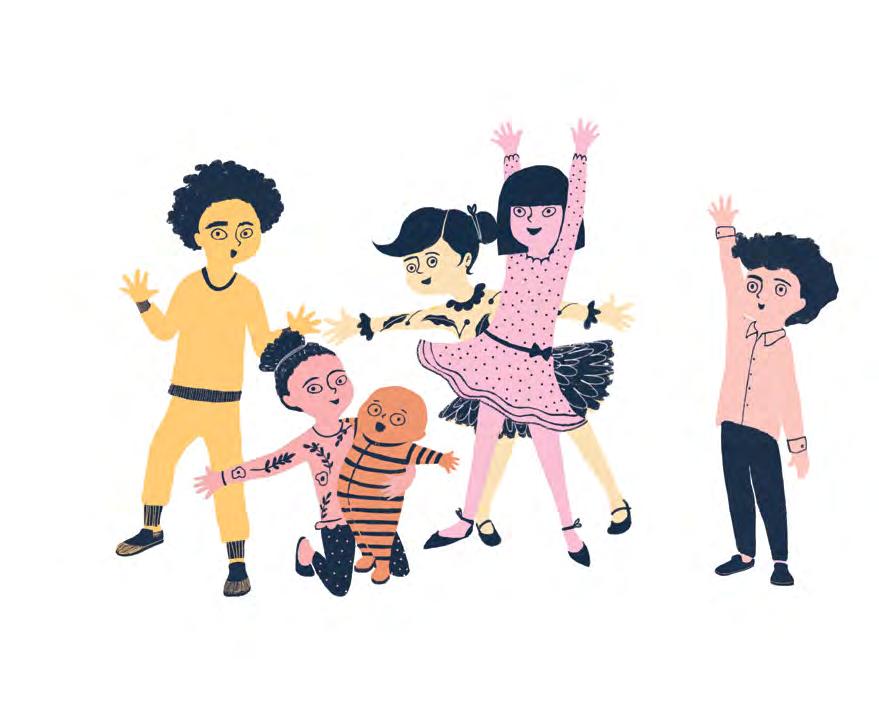


2
what’s in this book?
Welcome: This section sets the scene for the start of the seder.
First Steps: This section starts with the chanting of the steps of the seder. It includes the kiddush blessings said over our first cup of wine and other rituals that get us ready to tell our freedom story.
The Story of Freedom: The longest section of the seder is called Magid, which means “tell.” In this section we tell, sing, act, and ask questions about the Passover story from many different angles.
A Special Meal: We start our seder dinner with blessings over the second cup of wine and other special foods, and we end it with thanks for what we have eaten and blessings over our third cup.
Celebrate!: This section includes songs of joy and gratitude. Along with the fourth and final cup of wine, it concludes our seder.
Each section includes key blessings, songs, and other passages from the traditional text in Hebrew and in transliteration (Hebrew words printed in English letters) with clear English translations. Combine the explanations, Hebrew, and English in any way that works for your seder.
Look for these symbols throughout the Haggadah.
Seder means “order.” Even a simple Haggadah includes many different blessings, songs, and stories that take place in a traditional order. This Haggadah helps families keep track of their progress by dividing the seder into five sections: ?
QUESTIONS TO ASK AND DISCUSS AT YOUR TABLE

INTERACTIVE SONGS, BLESSINGS, AND EXPLANATIONS
It helps to have a leader direct activities and keep the evening moving smoothly.
3
Customize your seder
Customizing your seder is an important part of the experience. While creativity and surprise help us feel free — a good Passover feeling — planning some of your seder elements in advance will make the evening more fun and meaningful.
• Decorate. A special cup for wine, a decorated cloth to wrap the matzah, and placemats with drawings from the Passover story can make setting the table feel more special and build anticipation. Preparing them can give kids a role in getting ready, too.
• Add drama. Bring costumes or props to the table to encourage both adults and kids to get into the act.
• Snacks for all ages. Consider extending karpas (the vegetable appetizer dipped in salt water near the beginning of the seder) with extra vegetables and dips. Staving off hunger makes it easier to tell stories and ask questions until dinnertime. Just wait on eating matzah until its special moment arrives!

Bring your own stories. Do any friends or family members have a freedom story to tell? Bring images or objects from their experience to help show how “in every generation” we experience the journey to freedom. Consider inviting others to prepare some of these ahead of time too.
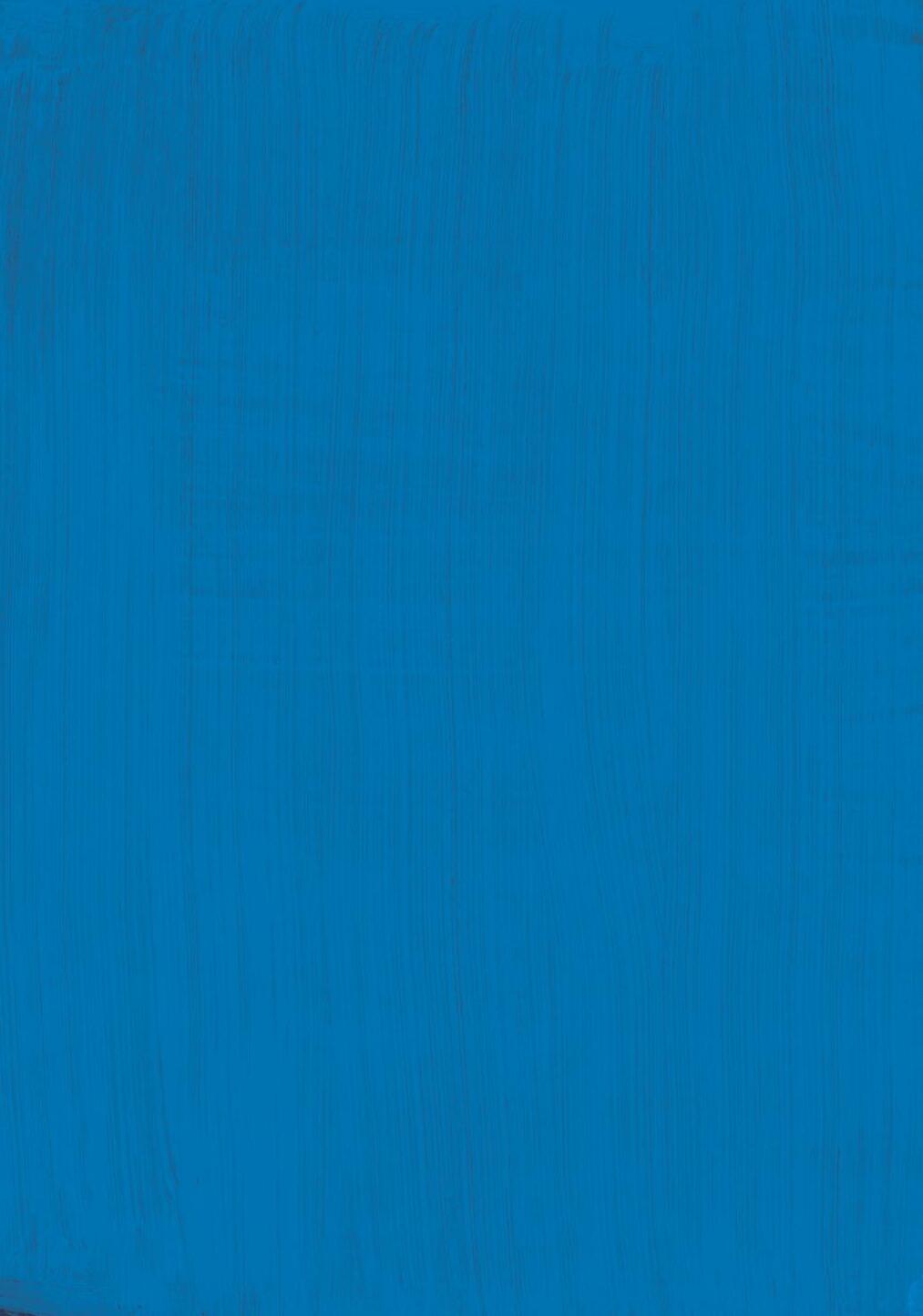
• Connect to the present. Learning about other people who have reached freedom in our own time, or who are still not free today, can help adults and kids understand the meaning of Passover.
• Sing out! Freedom songs in any language your family knows can enrich the Celebrate! section of the seder.
Visit pjlibrary.org/passover for videos and music to prepare for your seder. You can also find suggestions for an unabridged Haggadah that you can use in combination with this one, if you have different ages or levels of interest in your group.
4
CHECKLIST Pre-seder CHECKLIST
Wine for adults and grape juice for children (p.13)
Seder plate with:
Karpas - green herb or vegetable, such as parsley (p.17)
Z’roa - roasted lamb shank bone (p.43)
Maror - horseradish or similar bitter vegetable (p.51)
Charoset - mixture of chopped fruits, nuts, and spices (p.52)
Chazeret - bitter vegetable, often romaine lettuce (p.51)
Beitza - roasted egg (p.53)
Salt water (p.17)
Plate or cloth pocket to wrap three pieces of matzah (p.18)
Elijah’s cup and Miriam’s cup for special ceremonies (p.60)
Cushions to recline on as a sign of freedom (p.15)
Festive main meal (p.53)

5
The Seder Plate
The foods we eat tonight help tell the story of liberation from slavery. Items on the seder plate are reminders of things like the tears of slaves and the mortar for bricks used to build pyramids. We will talk more about these symbols during the seder.
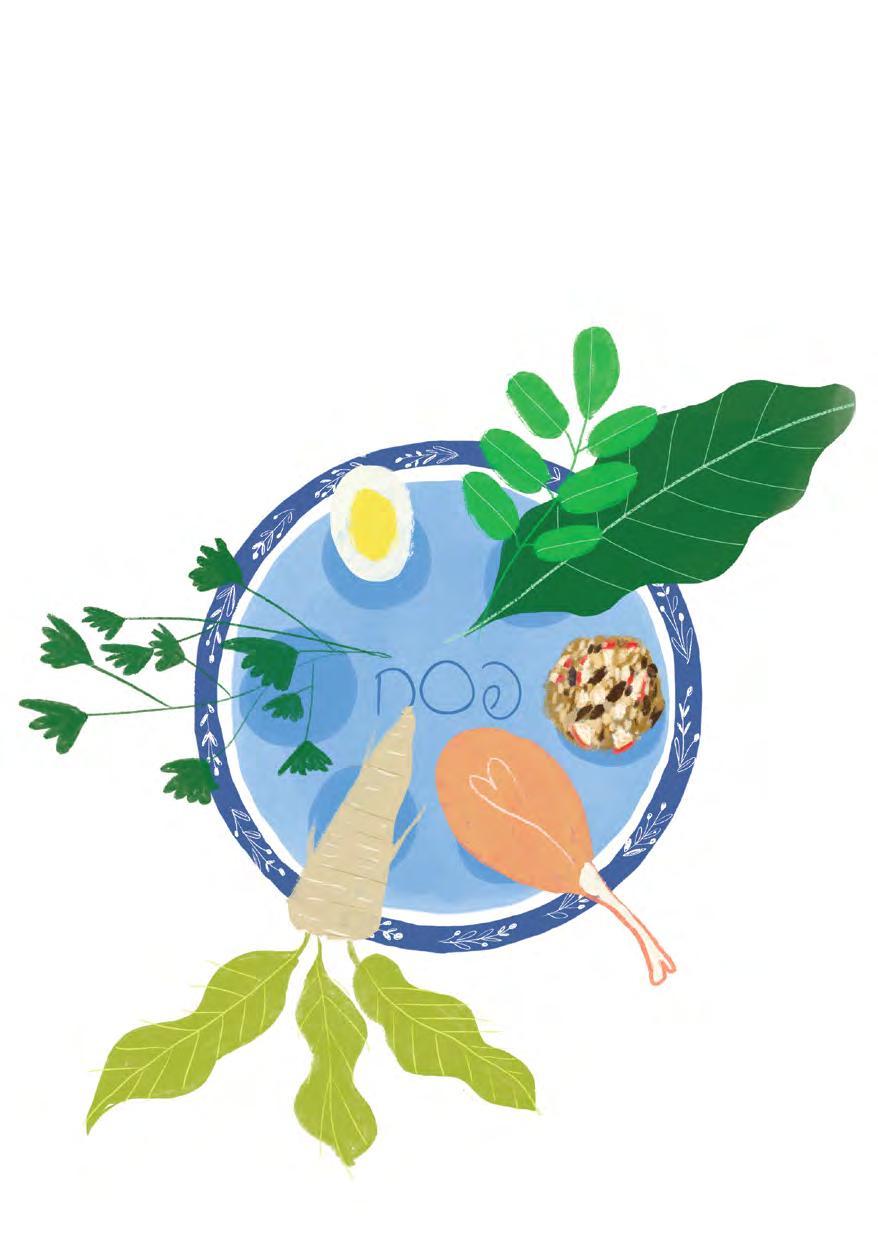
Chazeret, bitter vegetable, often romaine lettuce AND HOPE.
B e i tza, roastedegg
Karpas, green herb or vegetable, such as parsley
Charoset, sweet mortar-like mixture made of chopped fruit, nuts, spices, and wine
(some vegetarian families use a beet)
Maror, horseradish or similar bitter vegetable
Z
'roa, roastedlamb s hankbone
6
Salt water

W E L CO M E
WELCOME
Tonight we celebrate the holiday of Passover.
At dinner tables around the world, families sit together to tell the story of how the Jewish people went free from slavery in Egypt.
The seder is a meal at which people sing, ask questions, and tell stories. Some of the stories are from the Torah, the first five books of the Bible, that tell about the beginnings of the Jewish people.
At the seder, we travel back in time to ancient Egypt. Our guide for the journey is this Haggadah (hah-gah-DAH), which means “telling” in Hebrew. Telling the Passover story helps us feel that we ourselves are going free from slavery tonight.
To set the scene, we light candles and bless the children.

WELCOME 7
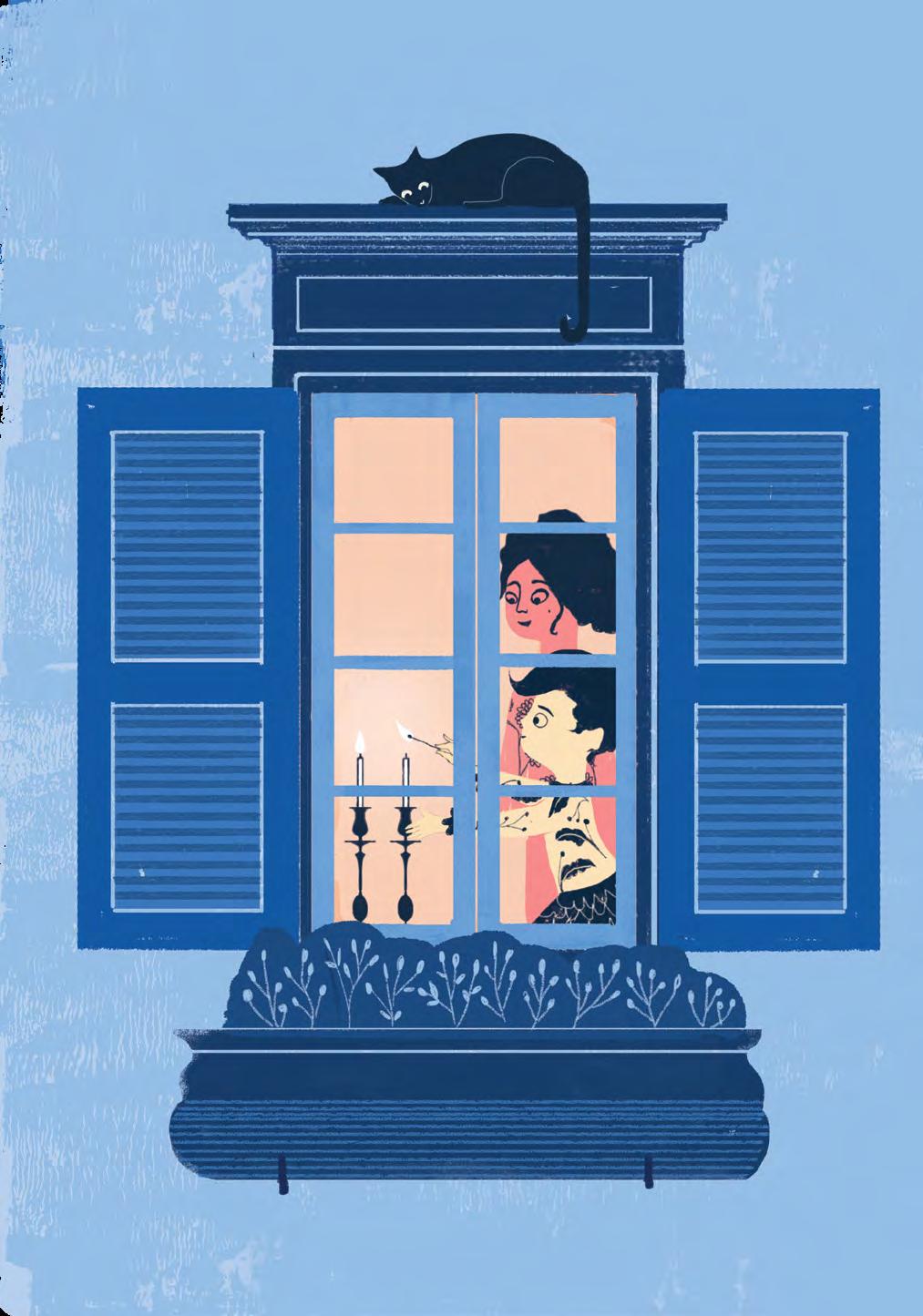
8

Light the candles and say the blessing.
LIGHTING THE HOLIDAY CANDLES
Jewish holidays begin at sunset with candle lighting. As darkness fills the evening sky, burning candles spark brightness inside. The candles’ warm light stands for hope and freedom. On the first night of Passover, an extra blessing is added to remember how special it is to celebrate a seder for the first time in a year — or even for the first time ever.
Here is how to say the Hebrew blessing.
Baruch ata Adonai, Eloheinu melech ha’olam, asher kideshanu bemitzvotav vetzivanu lehadlik ner shel (Shabbat veshel) yom tov.
Dear God, Creator of our world, thank You for giving us rules that make our lives special and for teaching us to light these holiday candles.

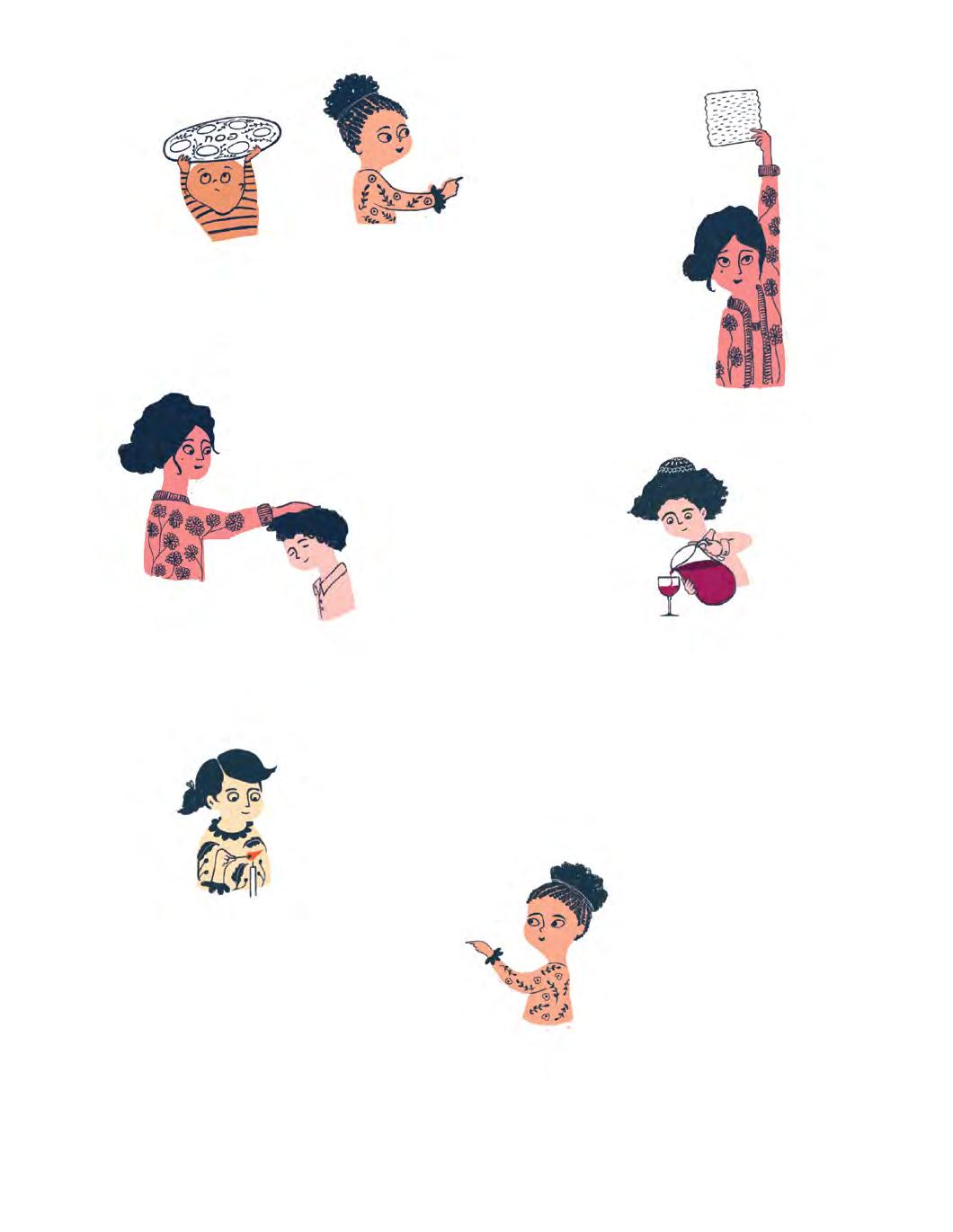
Baruch ata Adonai, Eloheinu melech ha’olam, shehecheyanu vekiyemanu vehigi’anu lazman hazeh.
Dear God, Creator of our world, thank You for keeping us alive so we can celebrate this important moment.
ויָת וֹ צִמְבּ וּ נשׁ דּ ק רֶשׁא םָל וֹע ָה ֶלֶמ וּ נ יֵה ֱא ָיְי הָתַּא וּ רָבּ .בוֹט ם וֹ י ( ל שׁ ו תָבּשׁ) לֶשׁ רֵנ קיִלְדַהְל וּ נ וּ צ ְו
.הֶזַּה ןַמְזַּל וּנָﬠיִגִּהְו וּנָמְיִּקְו וּנָיֱחֶהֶשׁ םָלוֹעָה ֶלֶמ וּניֵה ֱא ָיְי הָתַּא וּרָבּ
WELCOME 9


May God’s light shine on you and grace your life.
May God turn toward you and give you a world of peace.
Yisa Adonai panav eilecha veyasem lecha shalom.
10
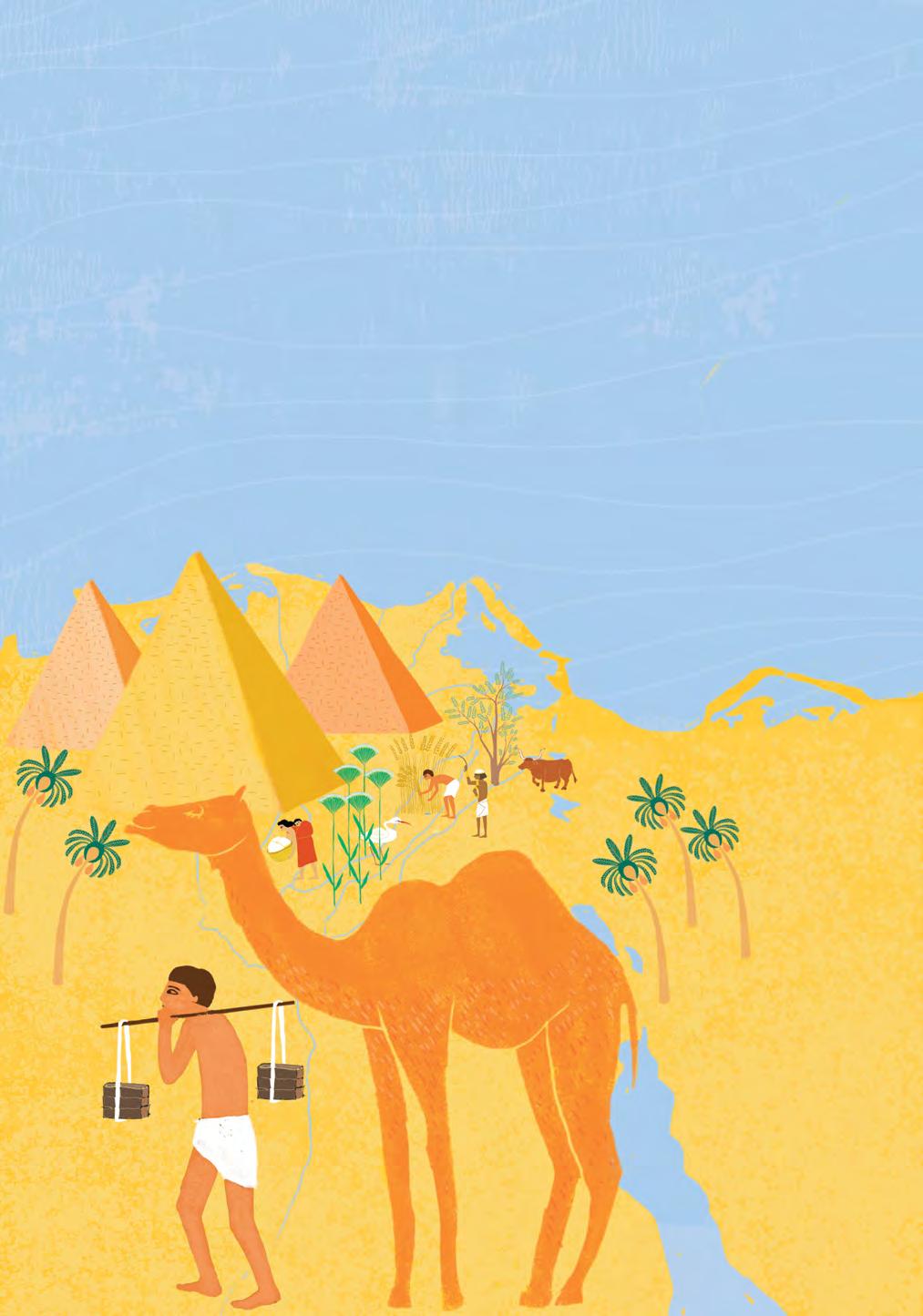
F I RS T S T E PS
FIRST STEPS
We’re ready to begin our seder.
Together we will taste the bitterness of slavery and the joy of freedom. All of the foods, rituals, and blessings we are about to say remind us that what makes tonight special is our freedom story.
First, we’ll read aloud a list of all the steps of the Passover seder. Then a special drink and snack will begin our journey back in time to when we were slaves in Egypt.
FIRST STEPS
11

SEDER MEANS “ORDER”
At the seder, we do 15 activities in a certain order. Some take only a minute to do, while others include many things to read, talk about, or sing. Reciting the 15 steps of the seder lays out the order of the seder, like a program at a play or a menu at a meal.

דּק ץַחְרוּ
Karpas (Eating the green vegetable with salt water) סַפּרַכּ
(Breaking off the dessert matzah) ץַחַי (Telling the Passover story) דיִגּ ַמ
Rachtzah (Second hand-washing) הָצְחָר איִצ וֹמ הָצּ ַמ
Maror (Eating the bitter vegetable) רוֹרָמ
Korech (Eating the matzah sandwich) ֵרוֹכּ ןָחְלֻשׁ
(Finding and eating the dessert matzah) ןוּפָצ
Hey, let's talk about this.
(Songs to finish our seder)
Shulchan Orech?
Does that mean we can eat?

Discussion time! 53 30 PAGE PAGE
ֵרָבּ
לֵלַּה
? 12


13
Baruch ata Adonai, Eloheinu melech ha’olam, borei peri hagafen
Dear God, Creator of our world,

If your seder is on Friday night, when Shabbat is starting, begin here and add any words that appear in parentheses on the next page.
When evening and daytime were over on the sixth day of Creation, the sky and earth and everything that lives in them were complete. Then, on the seventh day, God ended all of that work by resting. God blessed the seventh day and made it special, because it was the day when God rested from all the work of creating the world.
1 1
Dear God, Creator of our world, You have given all the people in the world different ways of living and believing. Thank You for giving us the gift of being Jewish and the rules and good deeds that help make us better people. With love You have given us holidays to be joyful. On this Festival of Matzah, we celebrate being free people. We remember how You took us out of the land of Egypt where we were slaves. Dear God, thank You for giving the Jewish people this special time to celebrate our freedom.
םָל וֹעָה ֶלֶמ וּ ניֵה ֱא ָיְי הָתַּא וּרבּ .ןֶפָגּ ַה י ִרְפּ אֵרוֹבּ
14


If your seder is on Saturday night, when Shabbat is ending, add:
Dear God, Creator of the world, thank You for making each time special in its own way.

FIRST STEPS ןוֹשׁ ָל לכִּמ וּ נָמְמ וֹרְו םָﬠ לָכִּמ וּ נבּ רַחָבּ רֶשׁא םָל וֹעָה ֶלֶמ וּ ניֵה ֱא יְי הָתַּא וּרָבּ םיִדֲﬠ וֹמ (וּ החָ וּ נמְלִ תוֹתבּשַׁ ) הָבֲהַאְבּ וּ ניֵה ֱא יְי וּ נָל ןֶתּתּו .ויָתוֹצִמְבּ וּ נשׁ דִּקְו
15

First Hand-Washing

We wash our hands so they will be ready to do special work. During
Three people can help each guest wash.
• One per
• A second person pitcher with water to pour over each guest’s hands, which are held over the bowl.
• A third person a towel for drying hands.
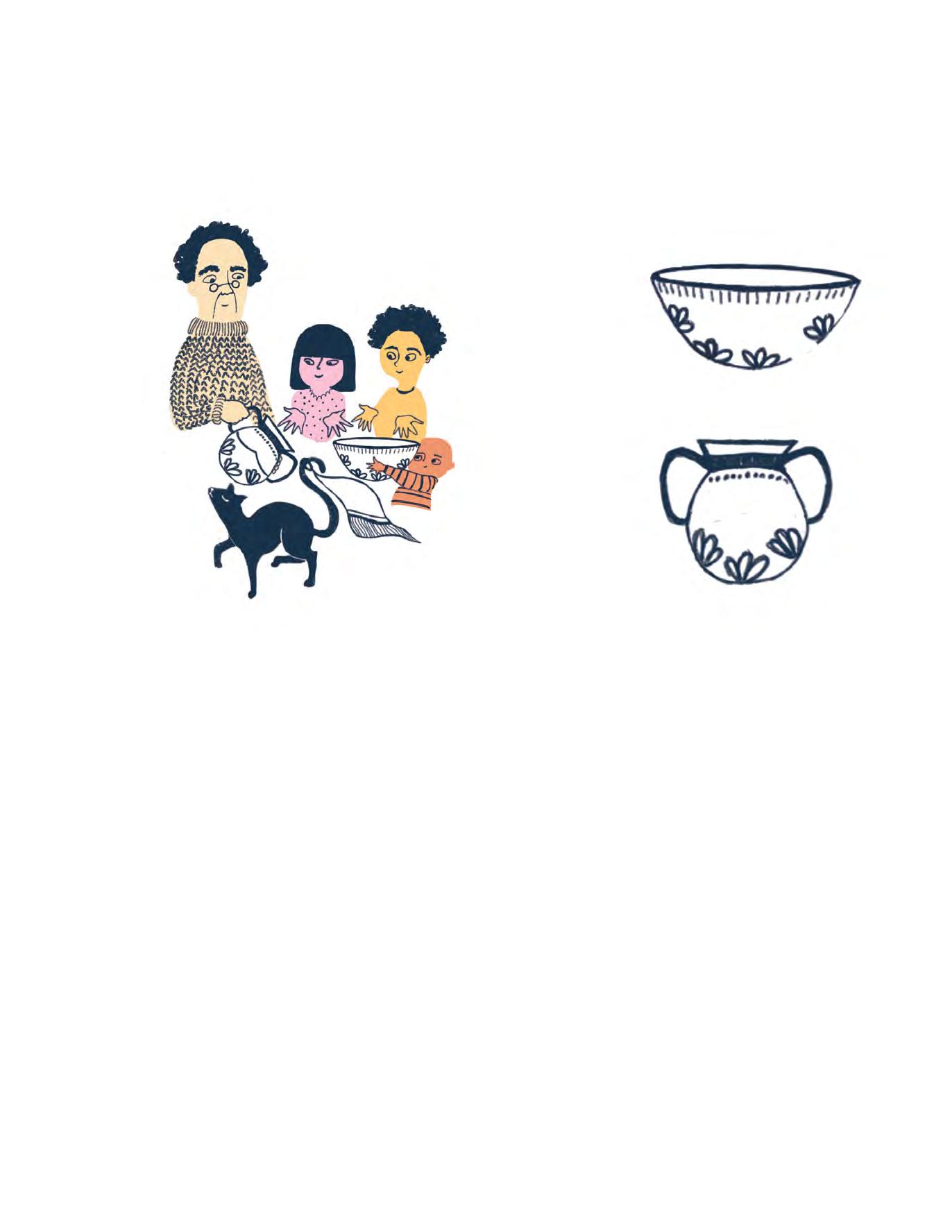
URCHATZ
16


KARPAS Eat a Green Vegetable Dipped in Salt Water
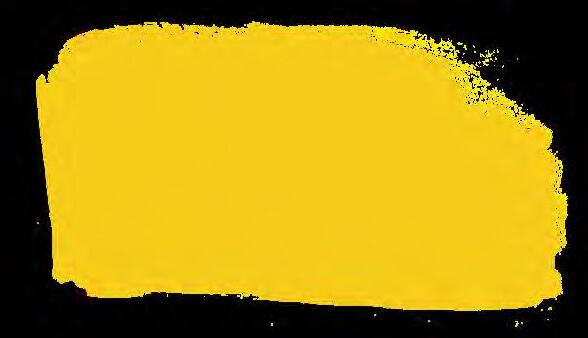
Passover celebrates the start of spring. As cold and dark days end, green leaves return to the trees and flowers blossom again. Trees and plants are free to grow. To mark spring’s return, we eat karpas (kar-PAHS), which means “green vegetable.”
Parsley or celery can be good karpas. Before we eat the karpas, we dip it in salt water. The salty taste reminds us of the tears that the slaves cried in Egypt. It also reminds us of the sad ness and pain of slavery.
Lean back in freedomandeat thesaltykarpas.


FIRST STEPS 17


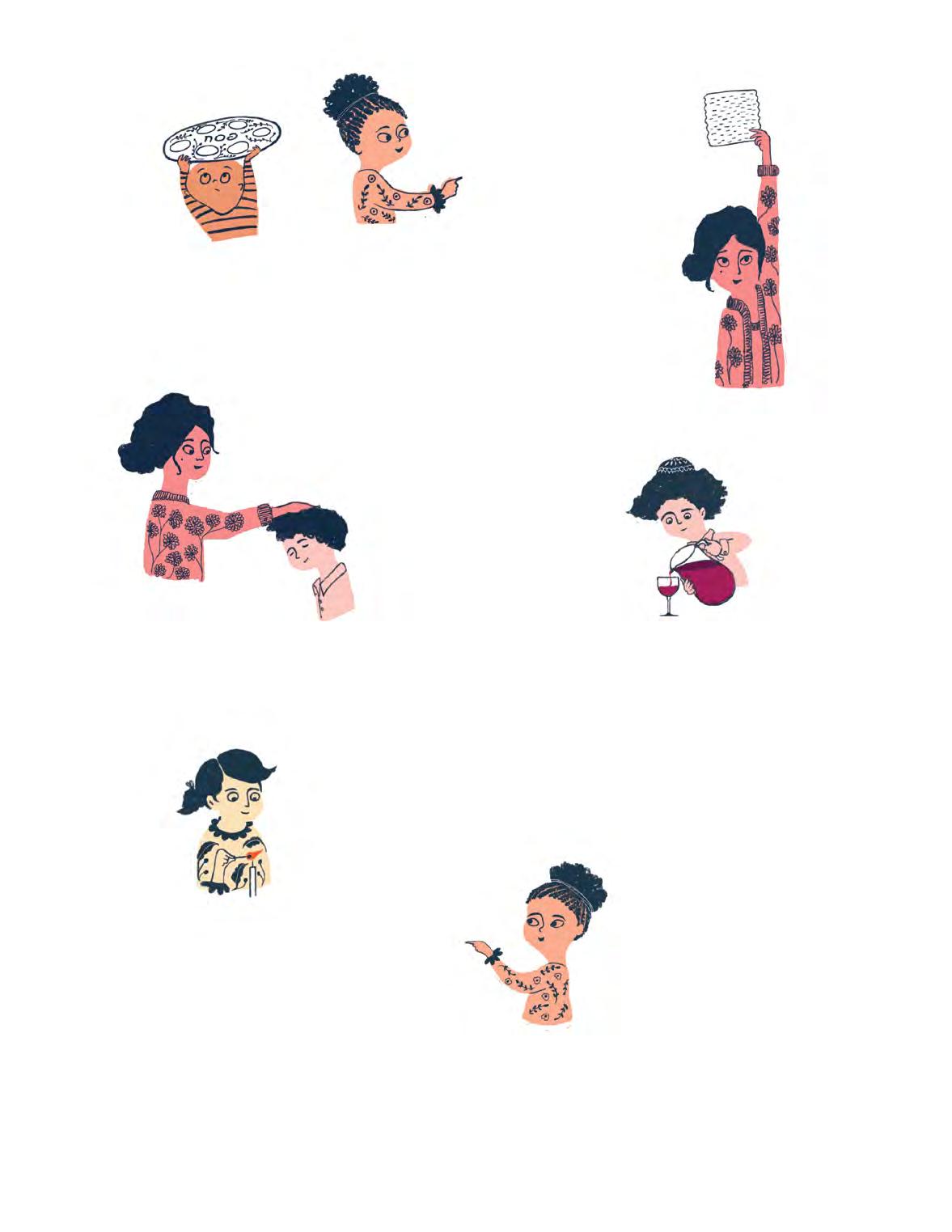
18


Put aside the then hide it when no children are looking.
FIRST STEPS 19

20

THE STORY OF FREEDOM MAGID
THE STORY OF FREEDOM MAKES
THIS NIGHT DIFFERENT.
Magid (mah-GEED) means “tell.” It is the longest part of the Haggadah, when we tell the story of how the Jewish people became slaves in Egypt and then became free. As part of the telling, we ask questions, invite discussion, and experience the story with acting and singing.
21
THE STORY
MAGID BEGINS WITH AN IMPORTANT ANNOUNCEMENT:
HA LACHMA ANYA
Matzah, the Bread of Slavery

Stand, hold up the matzah plate, nd recite the section below.

Ha lachma anya di achalu avhatana b’ar’a deMitzrayim. Kol dichfin yeitei v’yeichul. Kol ditzrich yeitei v’yifsach. Hashata hacha, leshana haba’a b’ar’a d’Yisra’el. Hashata avdei, leshana haba’a benei chorin.
This is the flat, plain bread that our family ate when they were slaves in the land of Egypt. Remembering the poor food of slaves, tonight we welcome anyone who is hungry to come and eat the Passover meal with us. Now we are here. Next year we hope to be in the Land of Israel. Now we are slaves. Next year may we all be free!
יֵתיֵי ןיִפְכִדּ לָכּ .םִיָֽרְצִמְד אָﬠְרַאְבּ
אָמְחַל אָה אָﬠְרַאְבּ הָאָבַּה הָנָשְׁל ˛אָכָה אָתַּשּׁ ָה .חַסְפִיְו יֵתיֵי יִרְצִ דּ לָכּ ˛לֻכֵיְו .ןיִרוֹח יֵנְבּ הָאָבַּה הָנָשְׁל ˛יֵדְבַﬠ אָתַּשּׁ ָה .לֵאָרְשִׂיְד 22
אָנָֽתָהְבַא וּלָֽכֲא יִדּ אָיְנַﬠ

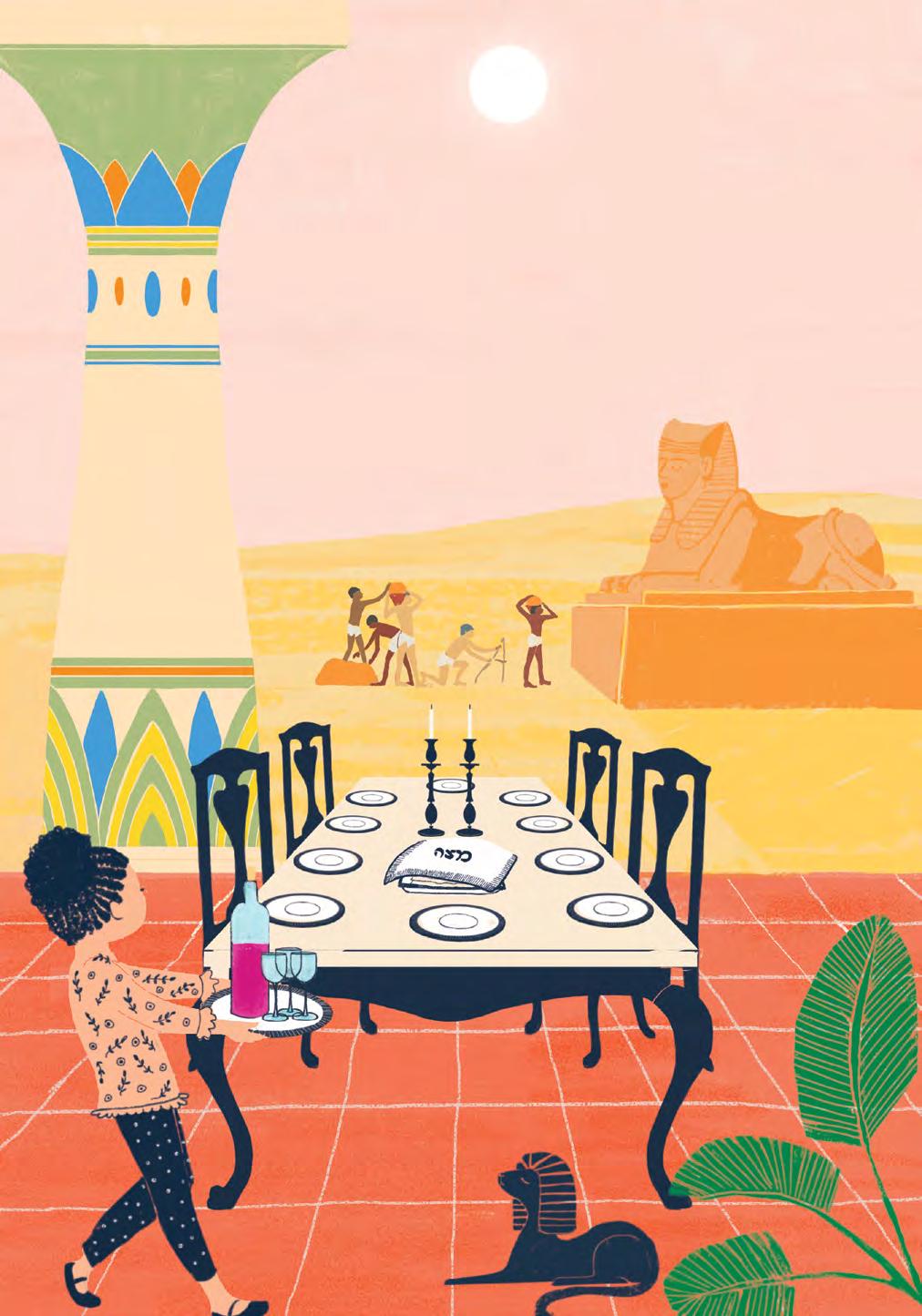
WAIT, WHERE ARE WE NOW?
The Haggadah gives a clue with the words: “Now we are slaves.” We are “here” in ancient Egypt. When we hold up the matzah, we imagine going back in time and becoming slaves. Now we are tired and hungry and have to eat quickly while we are forced to work.
Even though we are just beginning to tell how we became slaves, we’re already getting ready to go free at the end of the story.
or grape juice to get ready for the second cup. We will drink it later at the very end of Magid.
STORY 23
THE
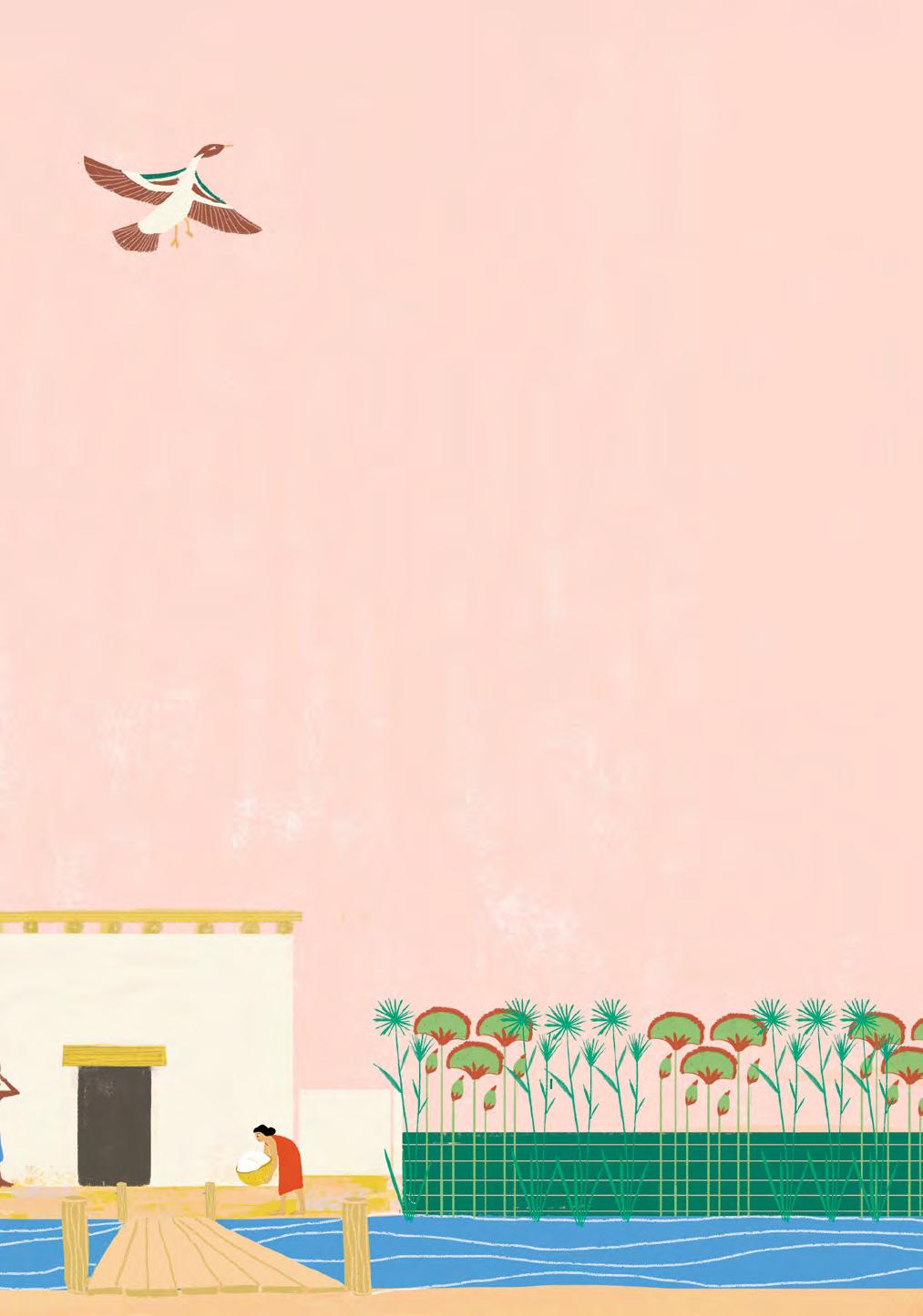
THE FOUR QUESTIONS
MA NISHTANA
Passover seders are unusual dinners, with unique foods and ways of eating. Why do we have these foods and rituals? How do they help us tell the story of having been slaves and then becoming free? Asking questions out loud and answering questions in ways that tell our own stories are both signs of being a free person.
Traditionally, the youngest person or people at the table get to ask the Four Questions.
These questions are introduced with the Hebrew phrase
Ma Nishtana (MAH neesh-tah-NAH), which means “What is different?”

Ma nishtana halaila hazeh mikol haleilot?
Why is this night different from all others?
הֶזַּה הָלְי לַּה הָנּתּשִׁנּ הַמ
24


Shebechol haleilot, anu ochlin chametz umatzah. Halaila hazeh, kulo matzah.
On all other nights we can eat chametz, bread that rises when it bakes. Why tonight do we eat only the flat bread, matzah?
Shebechol haleilot, anu ochlin she’ar yerakot. Halaila hazeh, maror.
On all other nights we eat any kind of vegetables. Why tonight do we eat bitter vegetables, maror? 2 1
.הָצַּמוּ ץ ֵמָח ןיִלְכוֹא וּנָא תוֹליֵלַּה לָכְבֶּשׁ .הָצַּמ וֹלֻּכּ הֶזַּה הָלְיַלַּה
.תוֹקָרְי רָאְשׁ ןיִלְכוֹא וּ נָֽא תוֹליֵלּה לָכְבּשׁ .רוֹרָמ הֶזַּה הָלְיַלּה
STORY 25
THE

Shebechol haleilot, ein anu matbilin afilu pa’am echat.
Halaila hazeh, shtei fe’amim.
On all other nights we don’t need to dip our food into a sauce even one time.
Why tonight do we dip foods two times?
3 4
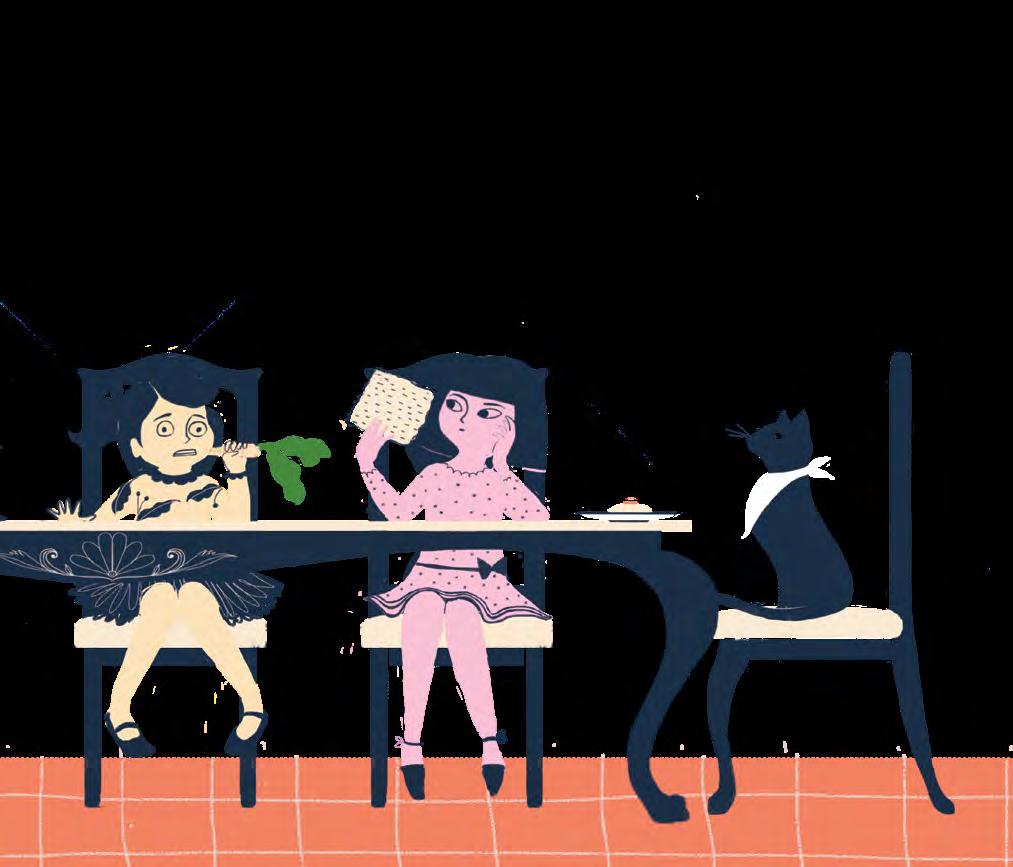
Shebechol haleilot, anu ochlin bein yoshvin uvein mesubin.
Halaila hazeh, kulanu mesubin.
On all other nights we eat sitting up straight or leaning. Why tonight do we make sure to eat leaning to our left?
.םיִמָﬠְפ יֵתּשׁ הזַּה הָלְיַלַּה .תָחֶא םַﬠַֽפּ וּלּ יִפֲא ןיִליִבּטַמ וּ נָֽא ןיֵא תוֹליֵלּה לָכְבּשׁ
.ןיִבּסְמ וּ נלּכּ הֶזַּה הָלְיַלּה .ןיִבּסְמ ןיֵבוּ ןיִבְשׁוֹי ןיֵבּ ןיִלְכוֹא וּ נָֽא תוֹליֵלּה לָכְבּשׁ
26

QUESTIONS ARE AN IMPORTANT PART OF THE SEDER. If you think of more good questions about the activities we’re doing or the story we’re telling, ask them!

Tonight’s seder is different from ordinary meals in all these ways because tonight is a special night. Tonight we are telling the Passover story, about how the Jewish people were slaves in Egypt and then became free.

Avadim hayinu, ata benei chorin! We were slaves, now we are free!


הָתּ ﬠ ˛ וּ ניִיָה םיִדָבֲﬠ
STORY
THE
?
27
THE FOUR CHILDREN
Chacham, rasha, tam, v’echad she’eino yode’a lish’ol Wise, Rebellious, Simple, Quiet
In the Torah, parents tell the Passover story to their children in different ways. The Haggadah tells us that’s because the children themselves are different. People learn stories in many different ways.
These four children are examples of different ways to ask and answer questions about Passover. As you read about them, try to think of other questions someone might ask about the seder and the story. What parts of the seder are you curious about?
You can also think about different ways someone might tell the story to help everyone learn it. How can food help us tell the story? How can

˛ ˛ ˛
wise child q u ietchild simplechil d r e bellious child
28





Parents can explain the reason for the seder simply: “God took Jewish slaves out of Egypt with surprising miracles.” On Passover, we are grateful to be free people.
THE QUIET CHILD IS LISTENING AND THINKING AT THE SEDER, BUT NOT SPEAKING OR ASKING.
Parents can explain, even without being asked, that we celebrate Passover because God freed us from being slaves. They can invite this quiet child to keep listening and thinking. On Passover, each of us learns in our own way about being free.
THE STORY 29

S TO R Y T E L L I N G , STORYTELLING,
THE MORE THE BETTER!
Now it’s time to add more details to our Passover story. We will tell how we became slaves in Egypt, what it was like for us there, and then how we were liberated.
The following four verses from the Torah tell the basic story, but there is a lot for us to describe, ask, act out, and explain. On Passover, we encourage everyone to talk about this story — the more, the better!

Scan to download the Novel Effect app. Read aloud when you see to bring to life with music & sound effects!
30


TO LIVE THERE
Our ancestors wandered from Mesopotamia. They traveled down to Egypt to live there, with just a few people. There they became a great nation with many, many people. ” “ ? ? ?

OUR ANCESTORS WANDERED Get up and wander! Pick a song to sing while everyone “wanders” around the table or the room. Then go back to your seat where you feel “at home.”
At first the Jews wandered from place to place, but they stopped wandering when they got to Egypt. Why did they stay there? What makes people feel at home in a new place?
Have you ever been a stranger in a new place, or with new people? How did it feel? Did some new people make you feel welcome? Was anyone angry or mean? How did you react?
A GREAT NATION
First, the Jews were a family, but in Egypt they became a nation. How is a nation similar to a family? How is it different? What makes a nation “great” besides having a lot of people?
THE STORY
31
“
The Egyptians were harsh to us, and made us suffer, and forced us to work very hard.
MADE US SUFFER The Torah tells that the Egyptians took children away from their parents. Moses, who led the Jews to freedom, was saved when he was a baby because his mother hid him in a basket that floated down the river.



32


WORK VERY HARD Pharaoh, the ruler of Egypt, forced the slaves to build cities and pyramids – and even make the bricks for building!
Is it cruel to make someone work hard? What kinds of hard work are good for us, and what kinds are cruel?

Pretend you’re a slave, lifting heavy bricks in the blinding sun. Your whole body aches and you’re not allowed to stop. Show how it feels to be forced to work so hard. What are you thinking to yourself as you work?
STORY
33
THE
?
“
We called out to God, whom our ancestors had prayed to. God heard our voice, and saw our pain, our struggle, and our suffering.
”

CALLED OUT What do you think the Jews said when they called out to God? Did they feel sad or angry, frightened or hopeful?

“Hey, God, listen!” Imagine you're a slave talking to God. How do you describe how you feel? What would you like to say to God?
GOD HEARD First, God heard the people’s voice when they called out. Then God saw how they felt. How is hearing what someone says to us different from seeing what their life is like?
OUR SUFFERING Who in the world today is suffering and needs help? Who do we know who helps other people, and how do they do it? Are there some ways we could help other people, too? ?
34
? ?


God took us out of Egypt, with a strong hand and an outstretched arm — with great power, and with signs and wonders. ” “
WITH A STRONG HAND What does it mean to say God did something “with a strong hand”?
Does someone at your seder table have a FREEDOM STORY to tell? Now is a good time to share it. ? ? ? ?
AN OUTSTRETCHED ARM Did someone ever “reach out,” with their arms or their words, to help you when you needed help? How did you feel before they helped you? How did you feel afterward?
SIGNS AND WONDERS Did you ever see something that made you feel a sense of wonder?

THE STORY
35
TEN PLAGUES
What were those powerful signs and wonders? We begged Pharaoh, the ruler of Egypt, to let us go free, but Pharaoh’s heart was as hard as stone. To change Pharaoh’s heart, God sent ten messages. Each message was a plague – something frightening or bad, that could make Pharaoh understand that what he was doing was wrong.
These Ten Plagues scared the Egyptians. Some of the plagues ruined things that Egyptians prayed to, like the Nile River and the sun. Some made them sick, like sores, or spoiled their food, like locusts that ate up the plants in the fields. After each plague, Pharaoh thought about letting the Jews go free, but he always changed his mind.
Finally, God sent the tenth – and worst – plague: the eldest son in every Egyptian family got sick and died. At last, Pharaoh said, “Enough! Let the Jews go.”

36


On Passover, we are grateful that extraordinary things happened to help us go free. But we’re also sad that other people suffered while we were saved. When we remember the Ten Plagues, we dip a pinky finger into our cup of wine or grape juice and take one drop out for each plague. We’re still joyful, but our cup of joy is not quite as full.

move a drop of wine or grape juice from your cup to your plate.
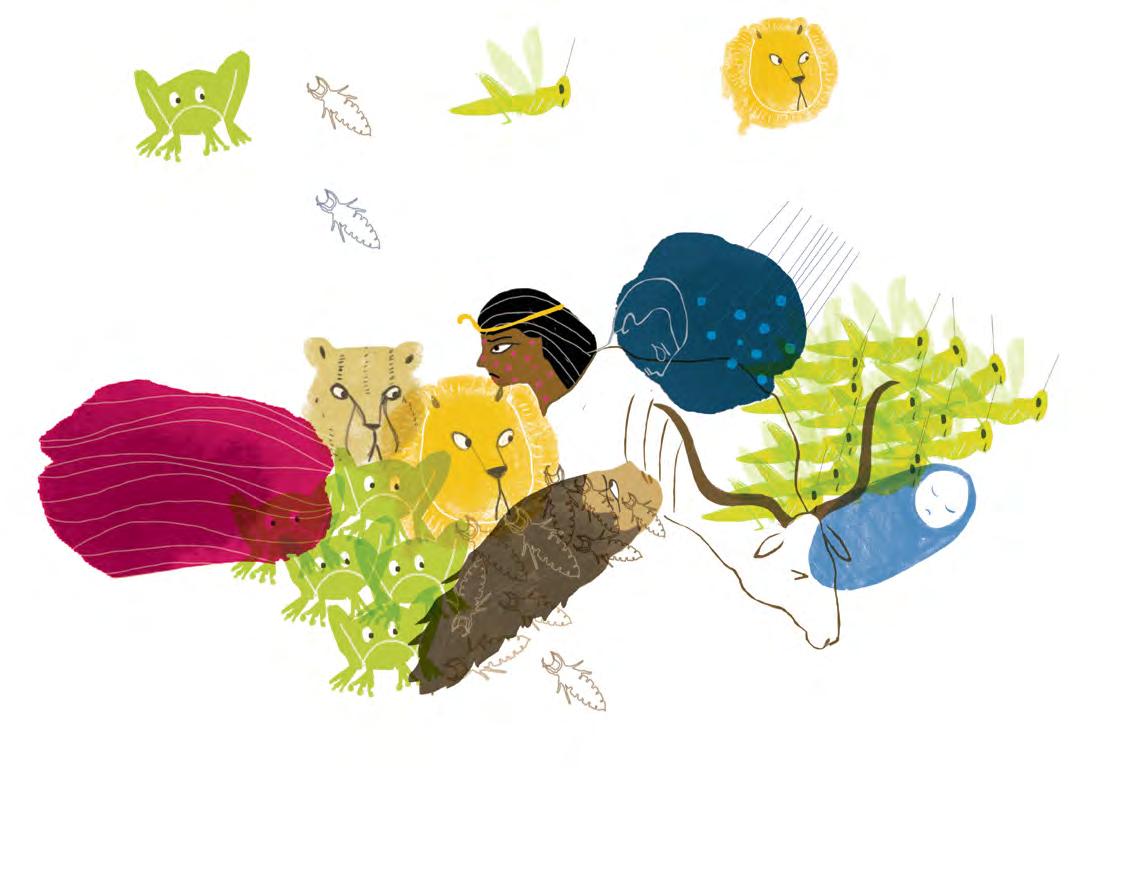


THE STORY 37
ick!
Pharaoh always changes his mind about letting us go free. We have to hurry. The morning bread we are baking can’t rise any longer. Throw the dough in a sack on your back. The sun will bake it into matzah. We have to run!
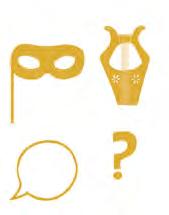
Act out the scene on these pages. As you read aloud the section to the left, how would you walk through the sea? Try to think of creative ways to re-enact crossing to freedom.


38

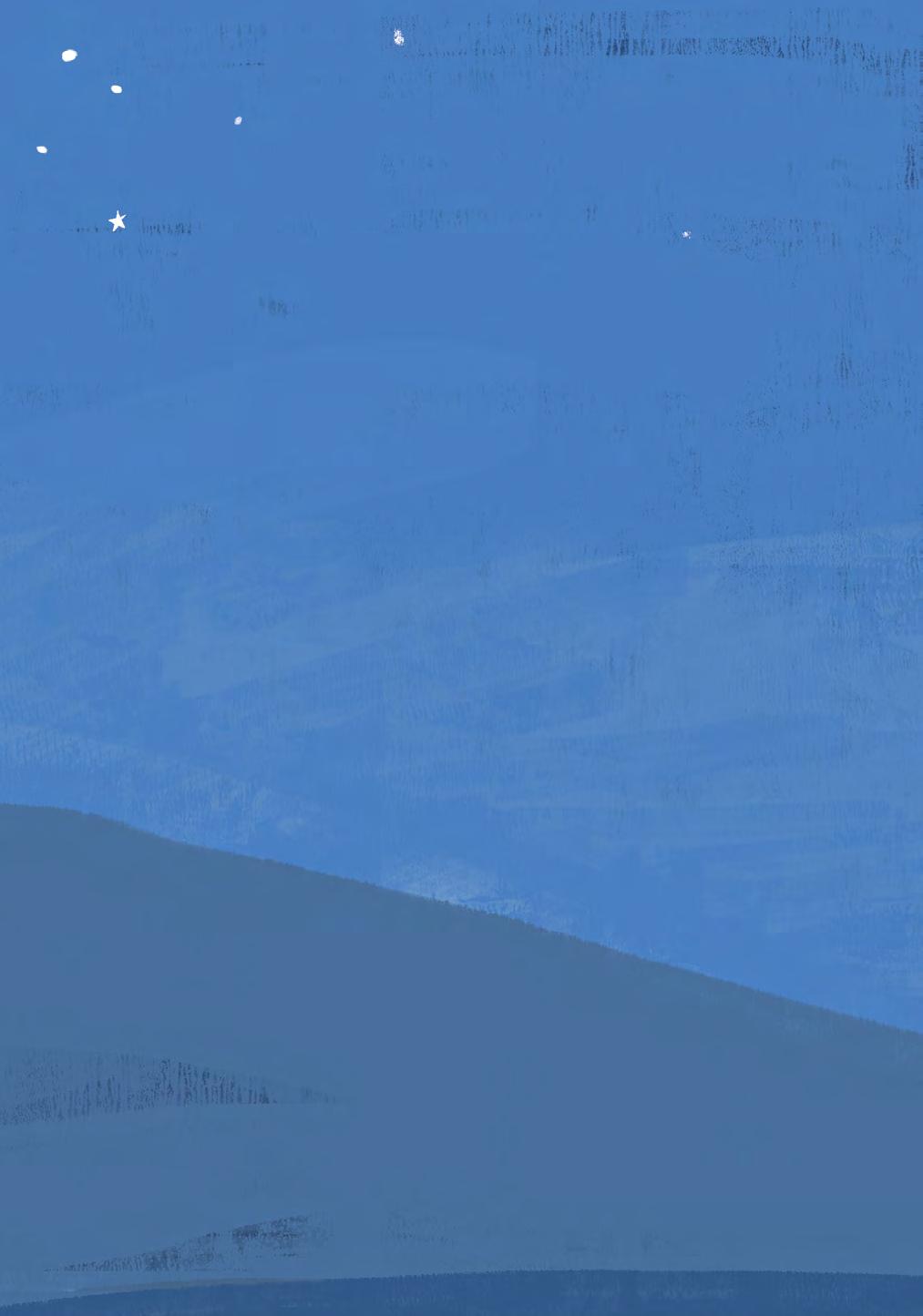
We are rushing away from Egypt toward the Sinai Desert. We come to the Sea of Reeds. On the other side is freedom.
Look! Pharaoh has changed his mind again. His soldiers are chasing after us, coming to drag us back to slavery. How can we get to the other side of the sea before they catch us?
But then a miracle happens. God sends a strong wind to push up the sea on both sides. We rush across between the walls of water. Just in time we make it to the other side. The walls of water crash back down, trapping the Egyptians. For a moment everything is quiet. Then we burst into song. We are free at last!


THE STORY 39

40
DAYENU More than Enough for Us!



Ilu hotzi’anu miMitzrayim: dayenu!
Ilu kara lanu et hayam: dayenu!
Ilu natan lanu et haShabbat: dayenu!
Ilu natan lanu et haTorah: dayenu!
Ilu hichnisanu l’eretz Yisra’el: dayenu!
If God had only taken us out of Egypt, it would have been enough.
If God had only split the sea for us, it would have been enough.
If God had only given us Shabbat, it would have been enough.
If God had only given us the Torah, it would have been enough.
If God had only brought us into Israel, it would have been enough.
!וּנֵיַּדּ :םִיַרְצִמִּמ וּנָֽאיִצוֹה וּלִּא !וּנֵיַּדּ :םָיַּה תֶא וּנָֽל עַרָק וּלִּא
!וּנֵיַּדּ :תָבַּשַּׁה תֶא וּנָֽל ןַתָנ וּלִּא
וּנָֽסיִנְכִה וּלִּא THE STORY 41
!וּנֵיַּדּ :הָרוֹתַּה ת ֶא וּנָֽל ןַתָנ וּלִּא !וּנֵיַּדּ :לֵאָרְשִׂי ץֶרֶאְל
TELLING THE STORY WITH FOODS: PESACH, MATZAH, AND MAROR
Maror
Lambbone(Pesach ) bitter vegetable
Matzah



42

Lamb bone
Point to the lamb bone on the seder plate.
This roasted lamb bone is called Pesach (PEH-sach), the Hebrew name for the Passover holiday. Why is it on our seder table?
On the Jews’ last night as slaves in Egypt, each family shared a feast of roasted lamb. When God sent the frightening Tenth Plague to every house in Egypt, God “passed over,” or skipped, the houses where Jews were getting ready to go free. The lamb was a sign to God that the Jews were choosing to go free.
The lamb bone connects us to that first Passover celebration and reminds us that we are choosing to celebrate Passover now.
Lift up the matzah in its cloth.
This matzah that we will eat in a few moments –why is it on our seder table? matzah
Matzah is made of the same dough as bread, but we mix and bake it much faster. That’s why it stays flat and dry. Matzah reminds us that when Pharaoh finally agreed to let us go, we had to leave Egypt fast! There was no time to get ready or to wait.
Eating matzah at the seder reminds us of slavery and also of freedom, because we took it with us to eat when we could not stay as slaves even one more hour.



THE STORY
43

Lift up the maror from the seder plate.
This bitter vegetable is called means “something bitter.”
Maror has a sharp, harsh taste. Eating the maror is supposed to sting our mouths a little. Maror’s harshness reminds us how hard and painful it was being a slave in Egypt. It helps us imagine soreness in our backs from lifting heavy bricks. It reminds us of the pain in our hearts when we thought we would never be free.
To understand how important freedom is, it is not enough for us to talk about slavery. Tasting the maror, we make sure we also feel at least a little bit of the slaves’ bitter pain. It helps us remember that when we get the choice, we choose to go free!
These three symbolic foods – the lamb bone, the matzah,




44

THANK AND PRAISE!
While you read this paragraph, lift up your cup and make a toast to freedom!
Because of all this, we thank and praise God, who did all these miracles for our ancestors and for us.
God led us from slavery to freedom, from despair to happiness, from sadness to a joyful holiday, and from darkness to a great light.
Let’s sing a new song to God. Hallelujah!
We are starting to sing and celebrate! Many more songs of thanks and praise will come after our main meal.


.הָּיוּלְלַה .הָשָׁדֲח הָריִשׁ ויָנָפְל Venomar
lefanav shira chadasha. Halleluyah!
THE STORY 45

When the Children of Israel marched out of Egypt, they left slavery and felt their new strength. When we left Egypt as free people, everything turned around. Even the sea flowed backwards, and the Jordan River flipped. The mountains danced like leaping rams, and the hills jumped like lambs.
Oh, Sea, how did you turn around like that?
Oh, Jordan River, how did you flow backwards?
The earth shook, and the rocks became a pool of cool, clear water,
A fountain bubbling with joy.


46
MEAL MEAL A SP ECIAL A SP ECIAL
We’ve told the story! Now we’re ready to eat some of those symbolic foods on the way to our festive dinner


A SPECIAL MEAL
47

SECOND CUP OF WINE
The second cup of wine or grape juice ends the storytelling part of our seder and begins our meal.
While you read these blessings, lift up your cup of wine or juice, like a toast to freedom. After you say the blessings, lean back and drink.
48

Second Hand-Washing and Blessings for Matzah
It is time to taste matzah for the first time this evening! Before we eat it, we wash our hands (rach-TZAH), this time to get ready for eating our main meal. It is a tradition to say the blessing over washing our hands right before we say the Motzi (MOE-tzee), the blessing for eating bread — and then, right away, the special blessing just for the first bite of

Make sure everyone gets a piece of the top matzah. Repeat the washing style from earlier in the seder on page 16 with three volunteers going around with a bowl, pitcher, and towel to wash and dry everyone's hands.
, , ˛ ˛
A SPECIAL MEAL CLICKON TEXT 49
BLESSINGS FOR HAND-WASHING, THE MEAL, AND MATZAH
Hold up a bit of matzah when saying the second and third blessings. .םִיָֽדָי תַליִטְנ לַﬠ וּנָוִּצְו ויָתוְֹצִמְבּ וּנָֽשְׁדּק רֶשֲׁא םָלוֹעָה ֶלֶמ וּניֵה ֱא ָיְי הָתַּא וּרָבּ .ץֶרָֽאָה ןִמ םֶחֶל איִצוֹמַּה םָלוֹעָה ֶלֶמ וּניֵה ֱא ָיְי

Baruch ata Adonai, Eloheinu melech ha’olam, asher kideshanu bemitzvotav vetzivanu al netilat yadayim.
Baruch ata Adonai, Eloheinu melech ha’olam, hamotzi lechem min ha’aretz.
Baruch ata Adonai, Eloheinu melech ha’olam, asher kideshanu bemitzvotav vetzivanu al achilat matzah.
Dear God, Creator of our world, thank You for giving us rules that make our lives special and for teaching us to wash our hands before we eat.
Dear God, Creator of our world, thank You for bringing bread out of the earth.
Dear God, Creator of our world, thank You for giving us rules that make our lives special and for teaching us to eat matzah at the seder.

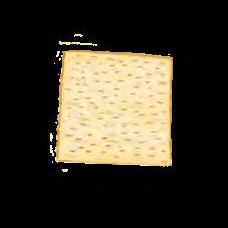

the blessings, lean back and

הָתּא וּרְָבּ .הָצַּמ תַליִכֲא לַﬠ וּנָֽוִּצְו ויַָתוְֹצִמְבּ וּנָֽשְׁדּק רֶשֲׁא םָלוֹעָה ֶלֶמ וּניֵה ֱא ָיְי הָתַּא וּרָבּ
50
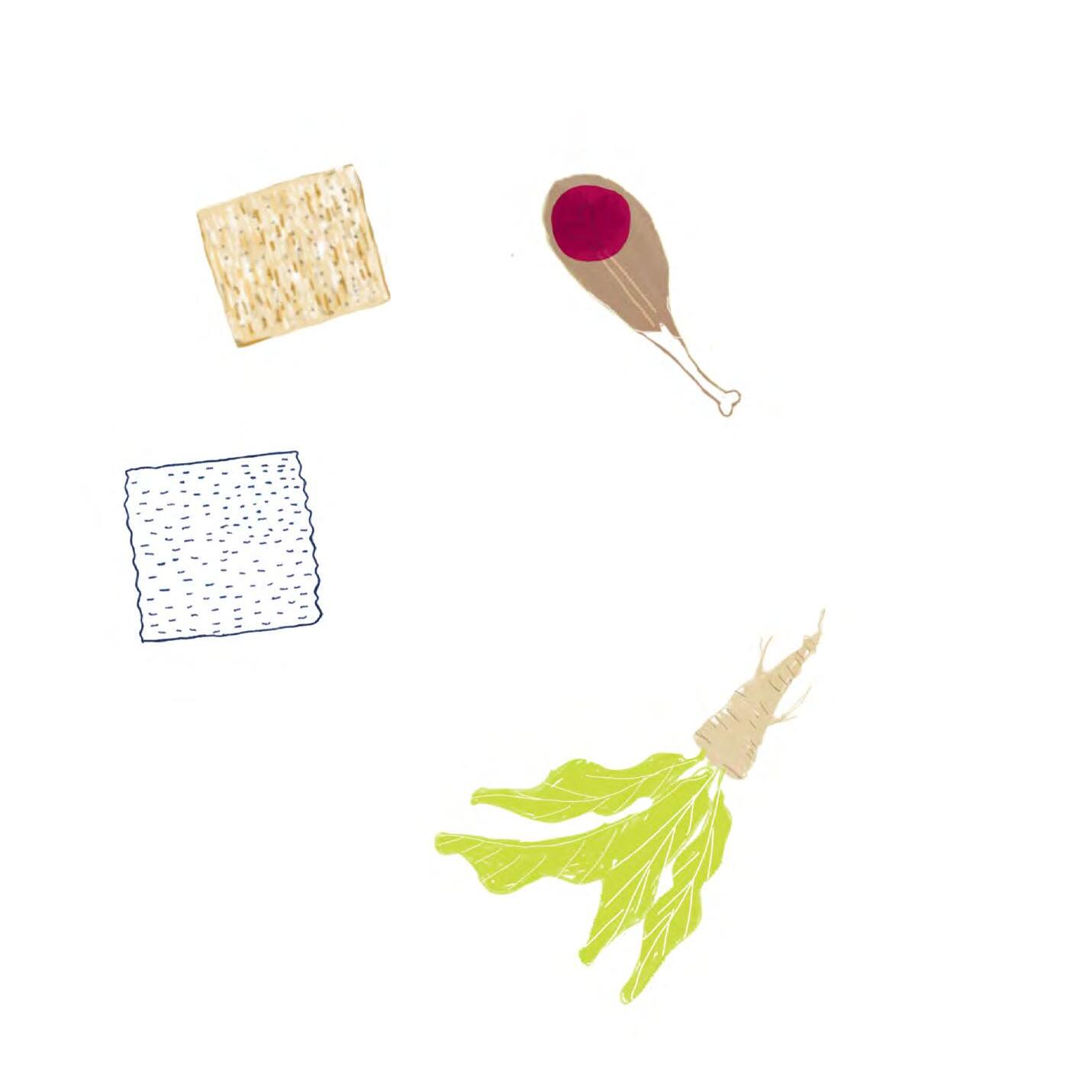

Eat the Bitter Vegetable
Maror, the bitter vegetable, gives a small taste of slavery. We say a blessing over the maror, but when we eat it we do not lean to the side. For this moment, we are slaves again.
Before we eat the maror, we dip it in charoset. (See the next page for a description of charoset.) This is the "second dipping" mentioned in the Four Questions, along with the dipping of karpas (parsley) in salt water. The maror can be eaten on a piece of matzah or inside a piece of romaine lettuce.
Prepare the maror and then say:
Baruch ata Adonai, Eloheinu melech ha’olam, asher kideshanu bemitzvotav vetzivanu
ar God, Creator of our world, thank You for giving us rules that make our lives special and for eaching us to eat this maror at the seder.

51
KORECH
Eat the Matzah Sandwich
Korech (koe-RECH) means “make a sandwich.”
Korech brings together all of the three foods that are symbols of the freedom story into one spicy bite. Because these days we no longer eat the Passover lamb, some people put charoset (chah-ROE-set ) in their korech.
Charoset means “clay,” and it looks like the clay used by slaves to make bricks for Pharaoh’s buildings.
There are many recipes for charoset, but it is always made from chopped fruit, spices, wine or juice, and often nuts. Apples, cinnamon, walnuts, and wine are common ingredients.
Give each person two small pieces of the bottom matzah. Put a bit of maror and charoset between them to make a small sandwich.
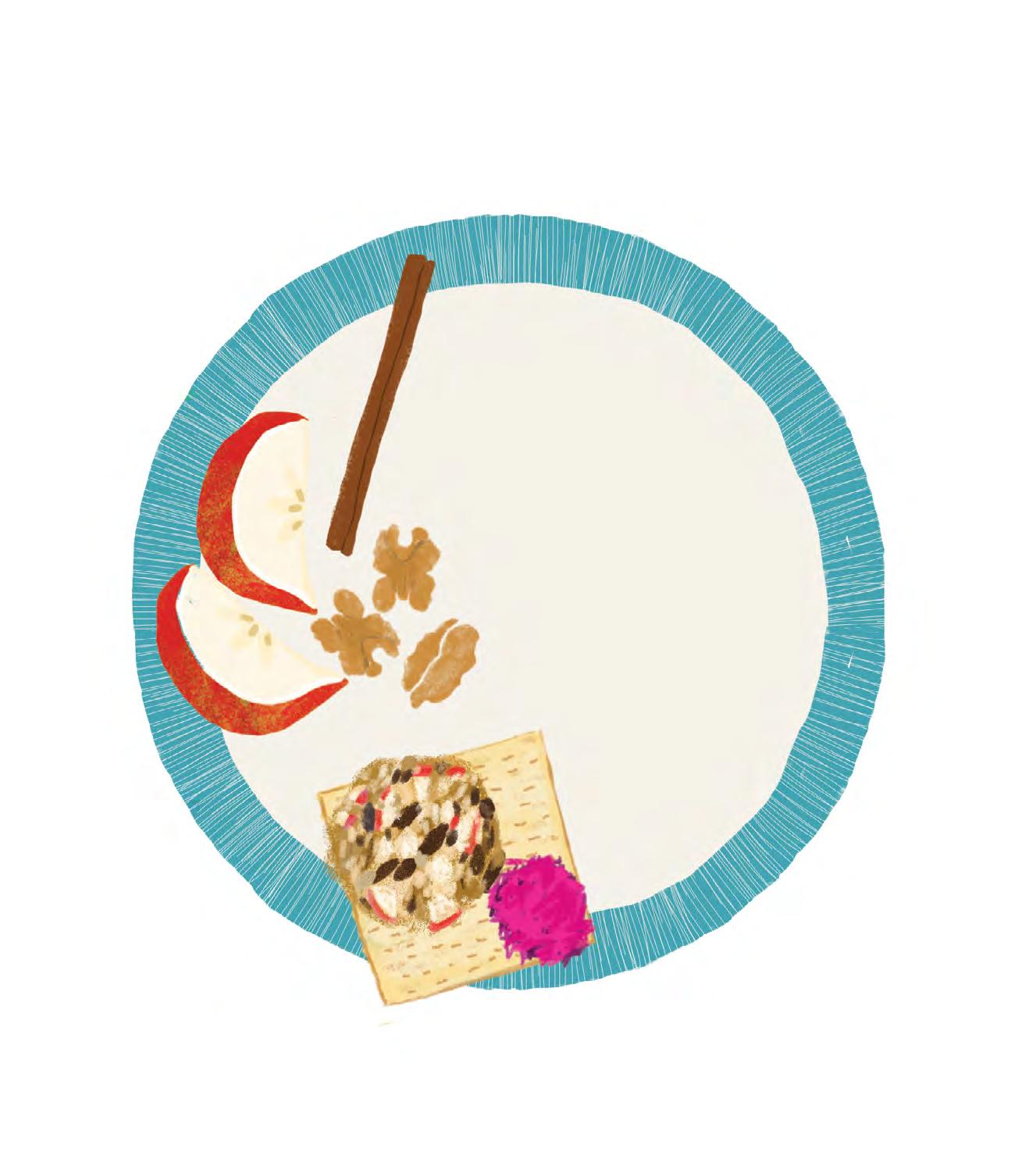
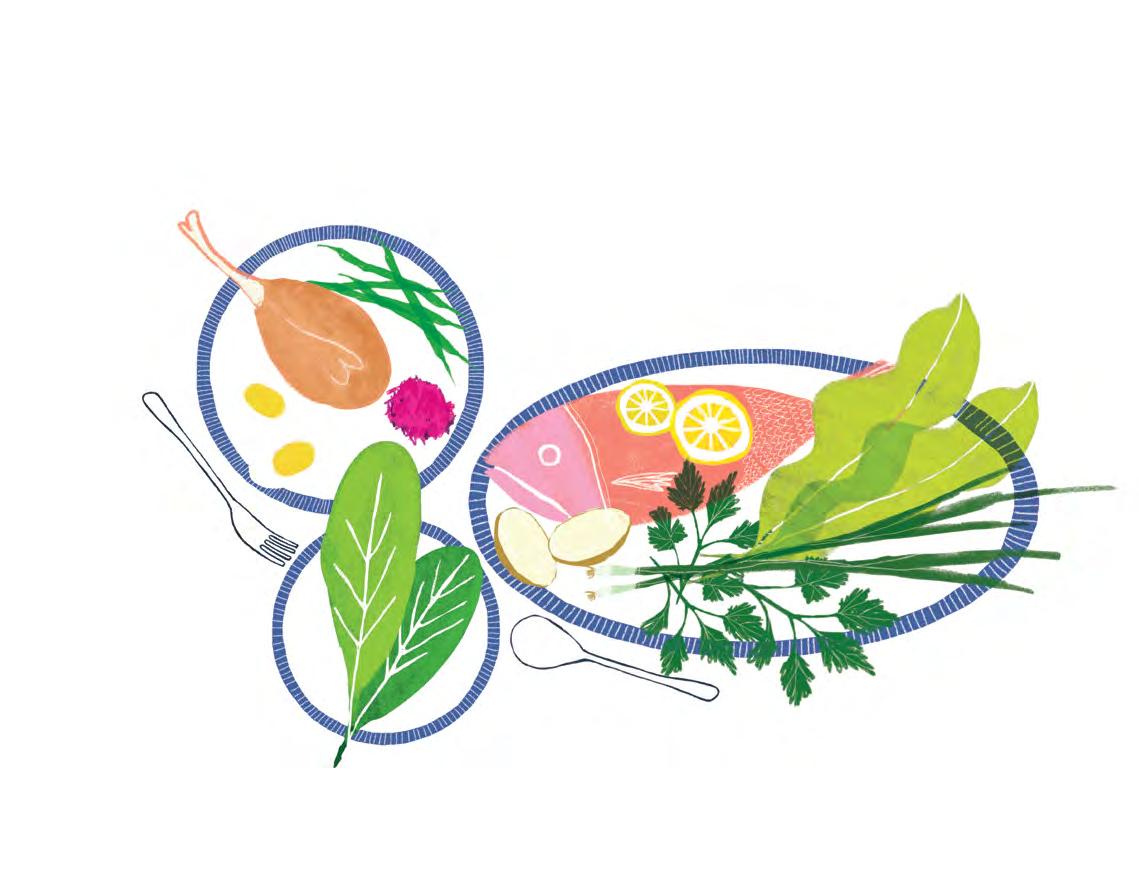

52

Say the paragraph below and then eat your sandwich.
Two thousand years ago, a teacher in Israel named Hillel created one of the world’s first sandwiches. Korech brings together in a matzah sandwich bitter maror and sweet charoset.
SHULCHAN ORECH


A SPECIAL MEAL 53
TZAFUN
Tzafun (tzah-FOON) means “hidden.” At the start of this seder, the adults hid the Afikoman. The meal cannot finish without this very unusual dessert – a last taste of matzah. The children have to find the Afikoman and make a deal with the adults to return the missing Afikoman. Remember, there is a prize for returning it!
The return of the Afikoman from its hiding spot means we are ready to finish our meal. At the beginning of the seder, matzah was the bread of poor slaves. Now that we are free people, with plenty of food, it is the bread of freedom and of remembering our history. With this last taste of freedom in our mouths, we are ready to say thanks for our meal and to continue the seder.
divide it into pieces so everyone gets a piece to eat.



54

55
! ֵרָבְנ יַרֵבֲח :ןמזמה
.םָלוֹע דַﬠְו הָתּ ַﬠ ֵמ ָרֹבְמ ָיְי םֵשׁ יִהְי :ןיבוסמה
.םָלוֹע דַﬠְו הָתּ ַﬠ ֵמ ָרֹבְמ ָיְי םֵשׁ יִהְי :ןמזמה
.וֹלֶּשִּׁמ וּנְלַֽכָאֶשׁ [וּניֵה ֱא] ֵרָבְנ ˛יַרֵבֲח תוּשׁ ְרִבּ
.וּניִיָח וֹבוּטְבוּ וֹלֶּשִּׁמ וּנְלַֽכָאֶשׁ [וּניֵה ֱא] וּרָבּ :ןיבוסמה
.וּניִיָח וֹבוּטְבוּ וֹלֶּשִּׁמ וּנְלַֽכָאֶשׁ [וּניֵה ֱא] וּרָבּ :ןמזמה
Leader: Chaverai, nevarech!
Group: Yehi shem Adonai mevorach me’ata ve’ad olam.
Leader: Yehi shem Adonai mevorach me’ata ve’ad olam.
Birshut chaverai, nevarech (Eloheinu) she’achalnu mishelo.
Group: Baruch (Eloheinu) she’achalnu mishelo uvetuvo chayinu.
Leader: Baruch (Eloheinu) she’achalnu mishelo uvetuvo chayinu. Baruch hu uvaruch shemo.
Leader: My friends, let us praise God for this meal.
Group: May God’s name be blessed now and always.
Leader: Let us bless our God, who created the world and made food for us.
Group: Thank You, God, for this food we have eaten.
Leader: You give us blessings, and we bless you.

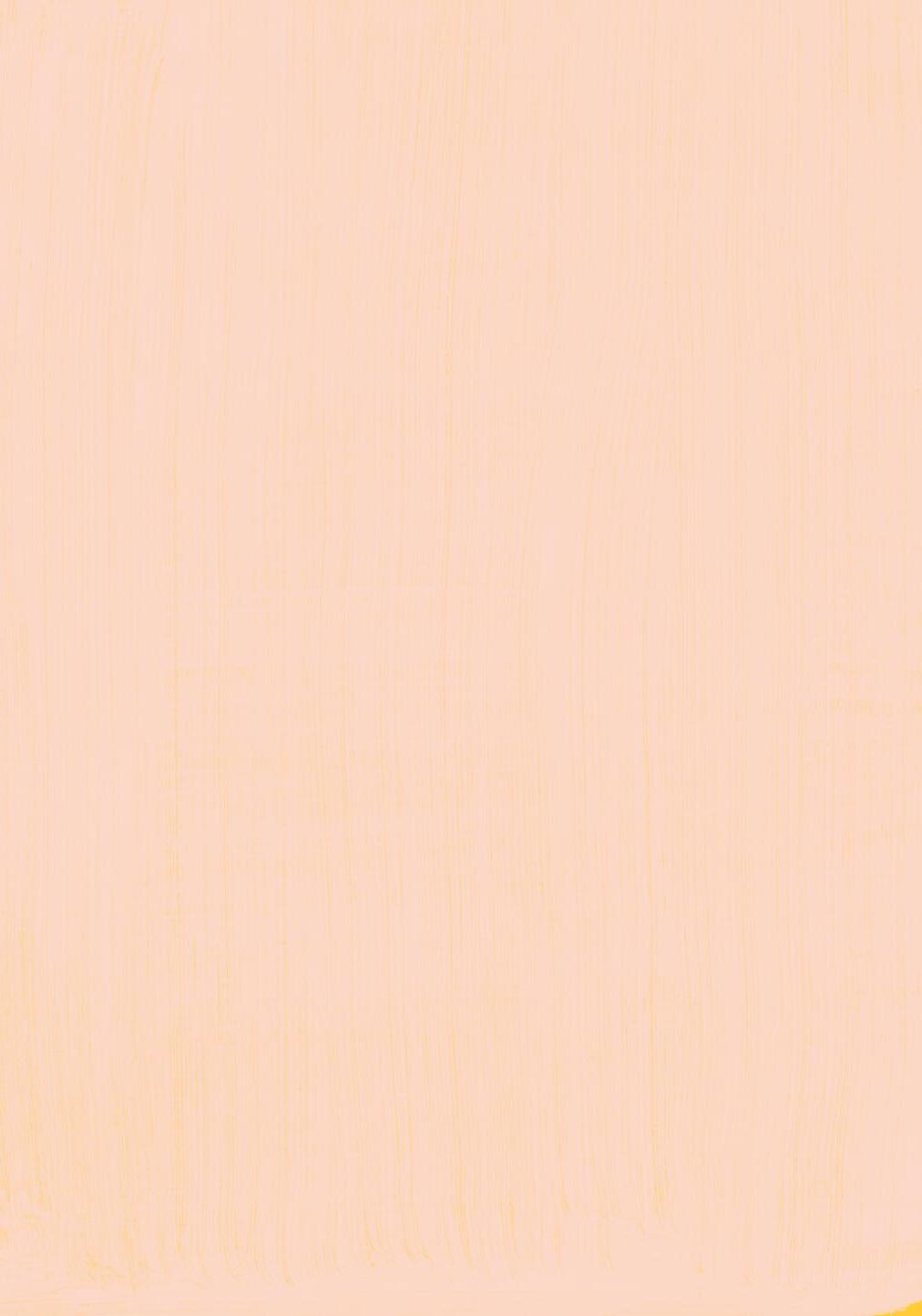
.וֹמְשׁ וּרָבוּ אוּה וּרָבּ
56



Oseh shalom bimromav, hu ya’aseh shalom aleinu v’al kol Yisra’el. V’imeru: Amen.
May God, who makes peace high up in the heavens, bring peace to us, to all the Jewish people, and to the whole world. Together we say: Amen.
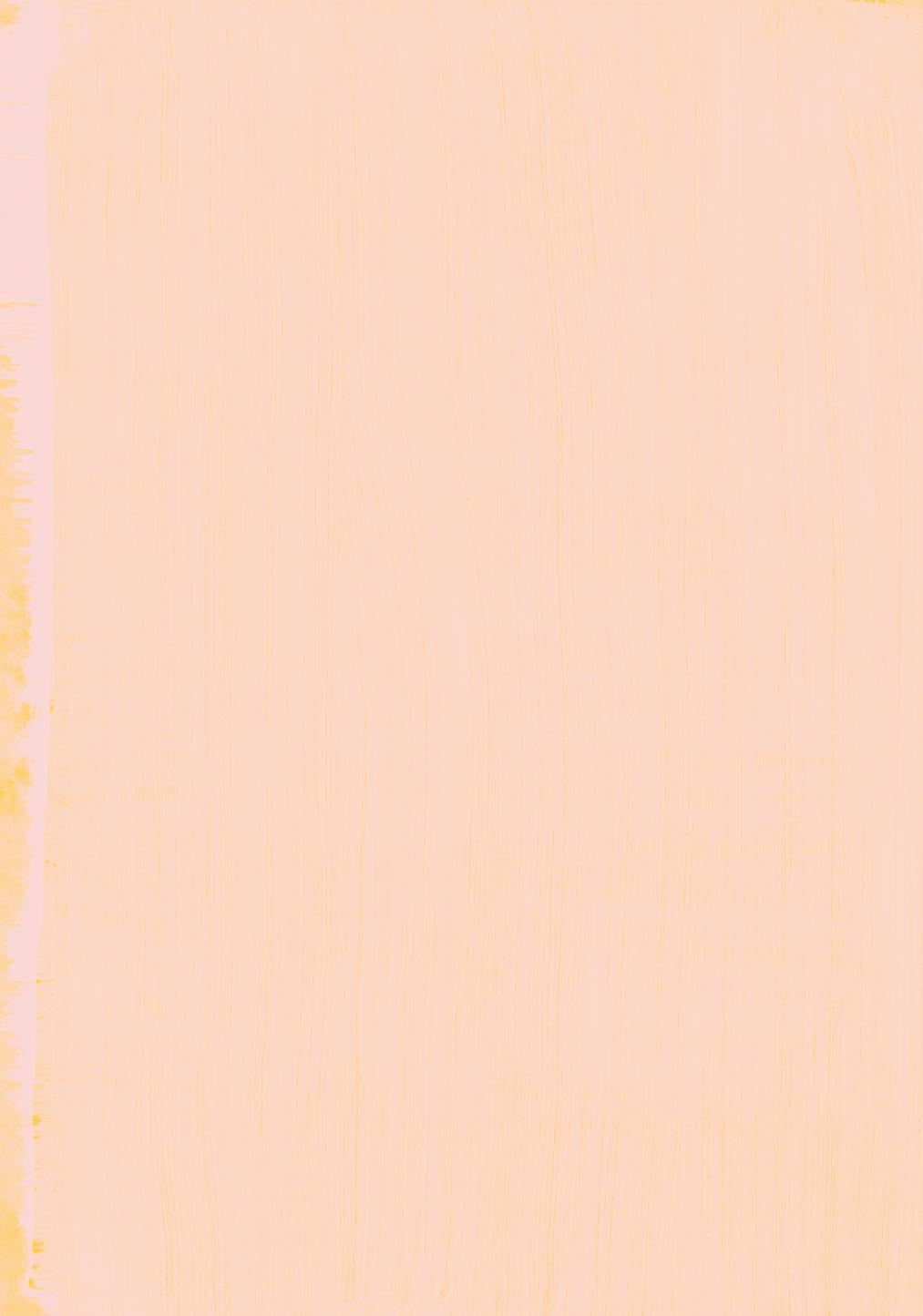
A SPECIAL MEAL 57
THIRD CUP OF WINE
Lift up the third cup of wine or juice. Say the blessing, and then drink while leaning.

Baruch ata Adonai, Eloheinu melech ha’olam, borei peri hagafen.
Dear God, Creator of our world, thank You for the delicious fruit that grows on vines.
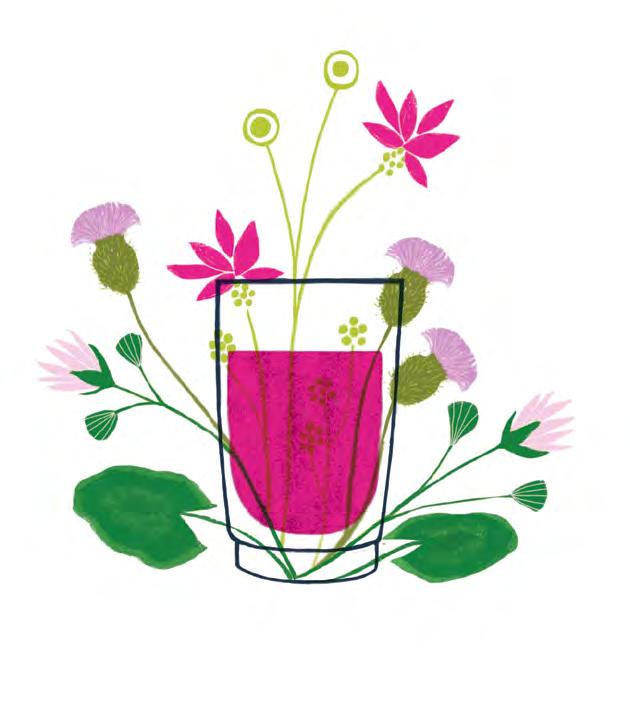
.ןֶפָגַּה יִרְפּ אֵרוֹבּ םָלוֹעָה ֶלֶמ וּניֵה ֱא יְי הָתַּא וּרָבּ
3 58
3




CELEBRATE! CELEBRATE! WE’RE FREE. LET’S 59
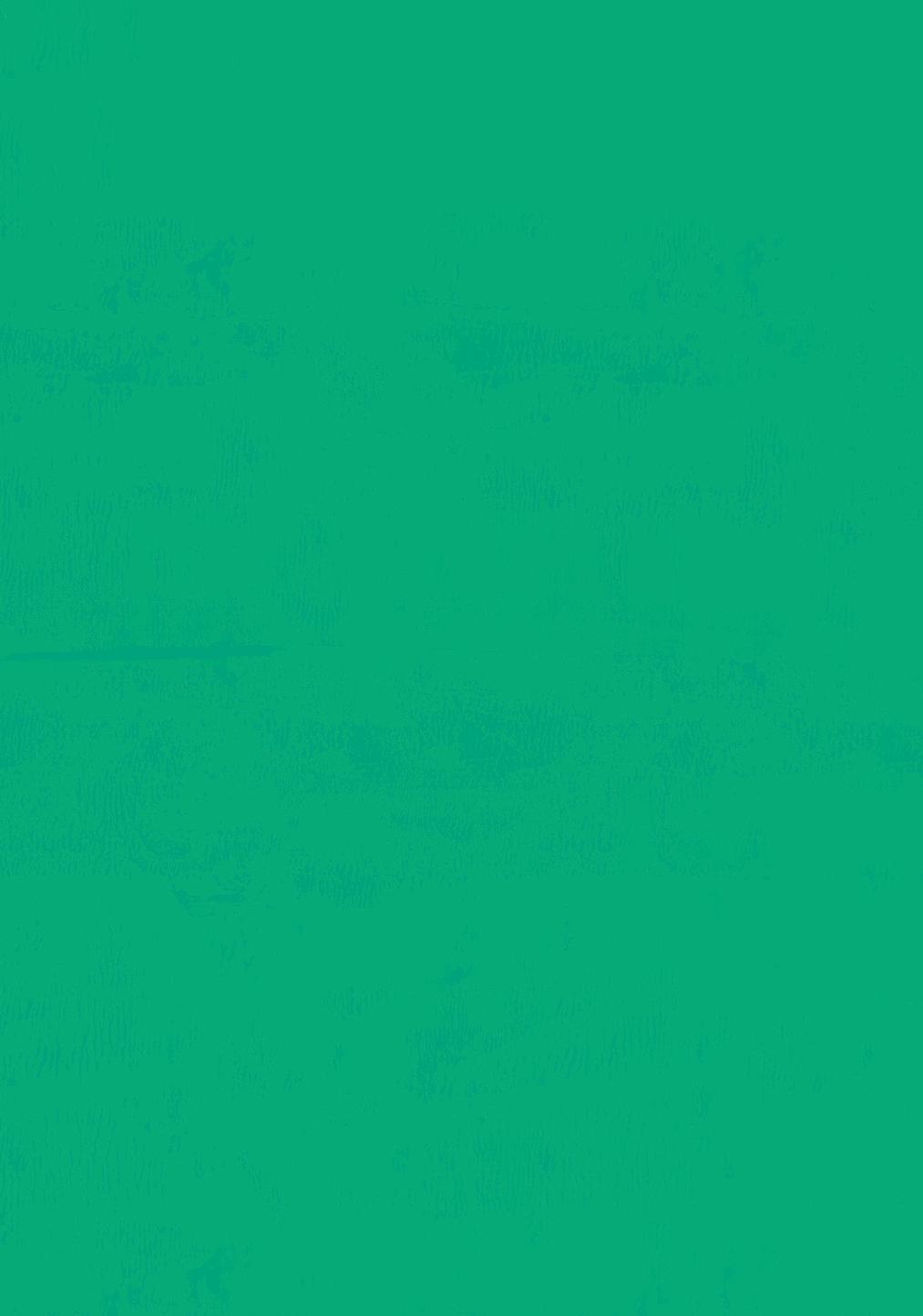
JAH ’SC
ELIJAH ’SCUP

Why do some people force other people to be slaves? Why do some people have hard lives while others get to be free? Why did Egyptians have to suffer when the Jews were being saved?
In many Jewish stories, a special man named Elijah the Prophet helps us dream of a happier and fairer world. On Passover, Elijah has a special job: he travels around the world to visit every seder, reminding us to have hope and keep working for fairness and justice.
We welcome Elijah with a special cup of wine, just for him.
60

Now we can ask: How can we help make a difference?
Can we make our world a place where Elijah would want to stay?
Together we sing a song for Elijah that hopes for a day when everyone will be free. .דִודּ ן


Eliyahu hanavi, Eliyahu hatishbi, Eliyahu hagil’adi Bimhera b’yameinu yavo eleinu im mashiach ben David.
Elijah the Prophet, Elijah from Tishbi, Elijah from Gilad Come soon to us, bringing a time of peace for the world.


CELEBRATE! 61
MIRIAM’S CUP
The Jewish people would not have gone free from Egypt without the actions of many brave women. Moses’ mother Yocheved and his older sister Miriam hid baby Moses in a basket on the Nile River. The Egyptian princess who found little Moses kept him safe in the palace. Shifra and Puah were midwives who also saved Jewish babies.
After the Jewish people escaped through the Sea of Reeds, Miriam led them in song. The tradition is that wherever Miriam traveled in the desert, a well of refreshing water would appear. Miriam’s music and pools of water kept the Jewish people strong on their long journey through the desert to Israel.
As we fill Miriam’s cup and take a sip from
Have everyone pour a bit of water into


62


CELEBRATE! 63
Pour the fourth cup of wine or grape juice to get it ready to drink after Hallel.
HALLEL
Singing Praise and Freedom Songs
Hallel means “praise.” The English word “Hallelujah!” is related to “hallel” and means “Praise God!” Before our meal we sang thanks to God for having saved us from slavery in Egypt, and now we sing about hope for the future.
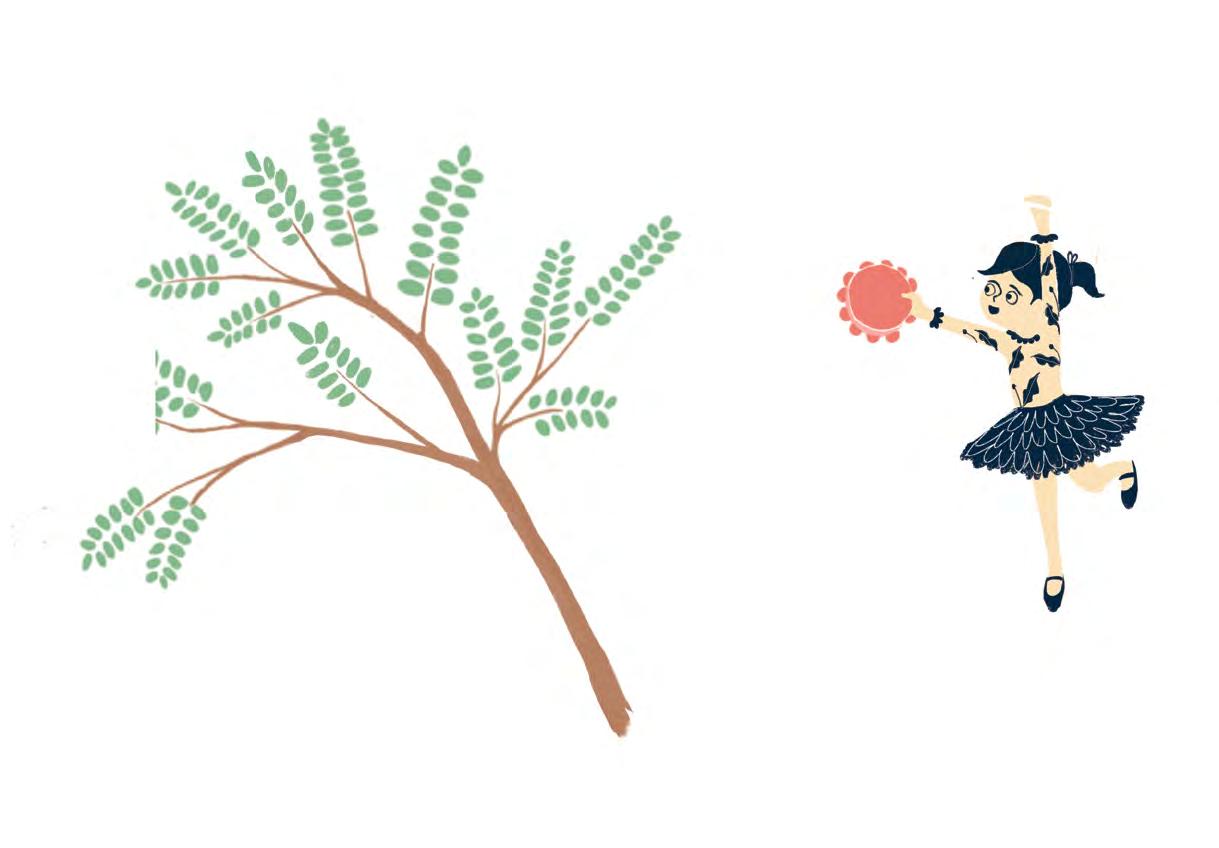

DO YOU KNOW MORE SONGS of praise or gratitude (maybe with the word “Hallelujah”) or songs about freedom? The songs can be in any language. Now is the time to sing them!

64



םָלוֹעְל
.וֹדּסַח םָלוֹעְל יִכּ
.וֹדּסַח םָלוֹעְל יִכּ
.וֹדּסַח םָלוֹעְל יִכּ
Hodu l’Adonai ki tov, ki l’olam chasdo.
Yomar na Yisra’el, ki l’olam chasdo.
Yomru na veit Aharon, ki l’olam chasdo.
Yomru na yir’ei Adonai, ki l’olam chasdo.
Let’s thank God, who is good. God’s kindness lasts forever.
Let the family of Israel say: God’s kindness lasts forever.
Let the family of Aaron say: God’s kindness lasts forever.
Let God’s followers say: God’s kindness lasts forever.
בוֹט יִכּ ָיְיַל וּדוֹה לֵאָרְשִׂי אָנ רַמאֹי ןֹרֲהַא תיֵב אָנ וּרְמאֹי
CELEBRATE! 65
י ְי יֵאְרִי אָנ וּרְמאֹי
FOURTH CUP OF WINE


Lift up the fourth cup of wine or grape juice, say the blessing, and then drink while leaning.
Baruch ata Adonai, Eloheinu melech ha’olam, borei peri hagafen.
Dear God, Creator of our world, thank You for the delicious fruit that grows on vines.
םָלוֹעָה ֶלֶמ וּניֵה ֱא ָיְיוּרָבּהָתַּא .ןֶפָגַּה יִרְפּ אֵרוֹבּ
4
66
4




NIRTZAH
The End
This last part of our seder is called Nirtzah (near-TZAH), a quick way to say: “Our seder is ending and we hope God accepts our thanks.” We celebrate the end of the seder with a few classic Passover songs.
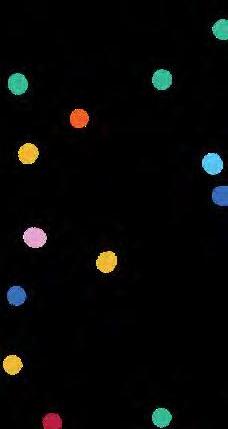

Let's sing!



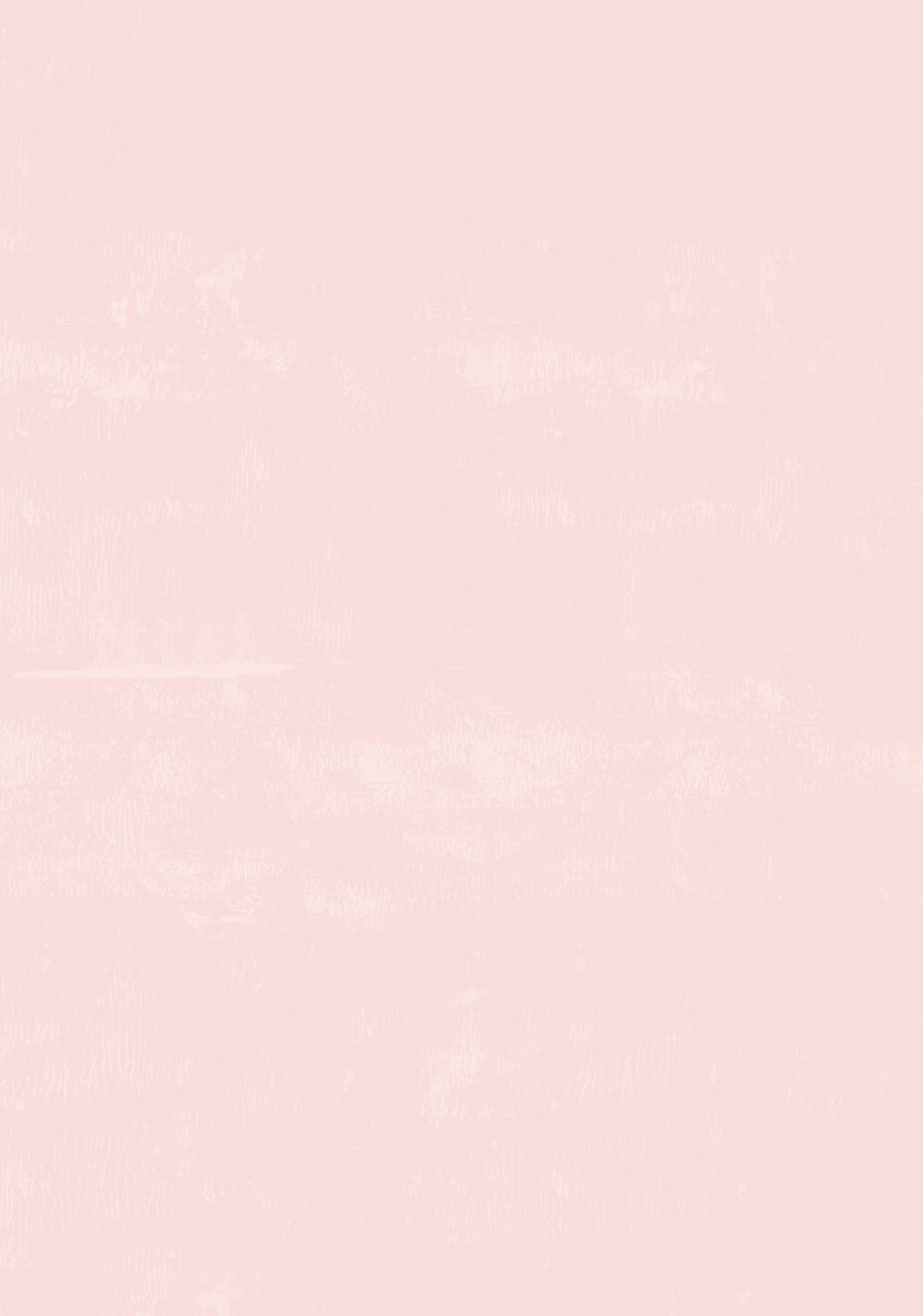

CELEBRATE!
67

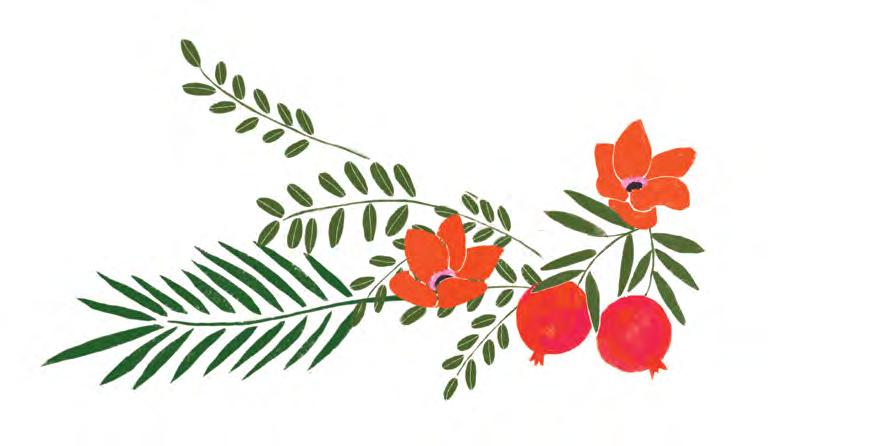
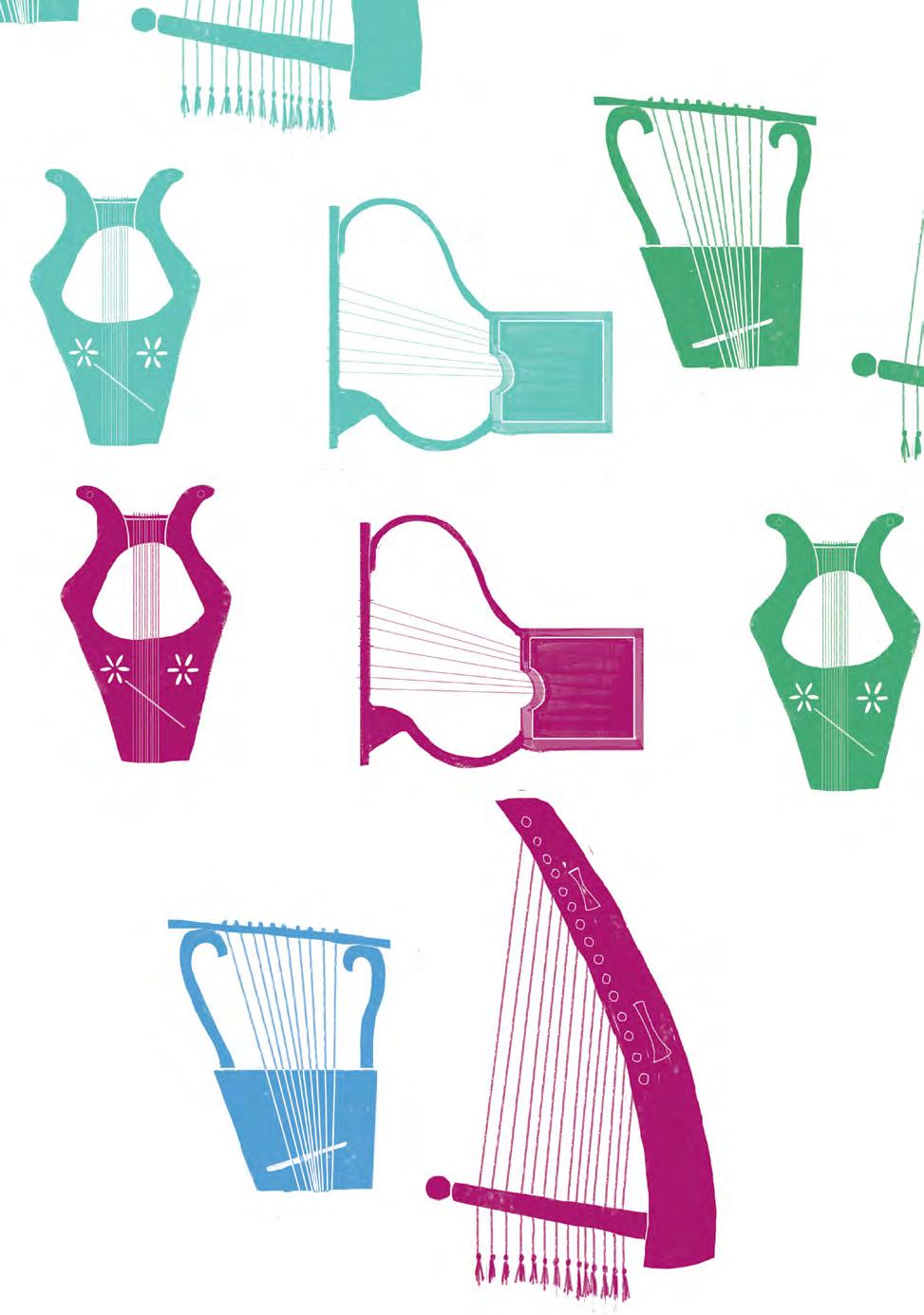
בוֹרָקְבּ ְתיֵב הֵנְבּ ˛הֵנְבּ לֵא .בוֹרָקְבּ וּניֵמָיְבּ הָרֵהְמִבּ ˛בוֹרָקְבּ וֹתיֵב הֶנְבִי אוּה ריִ 68







CELEBRATE! 69
Who Knows One ?









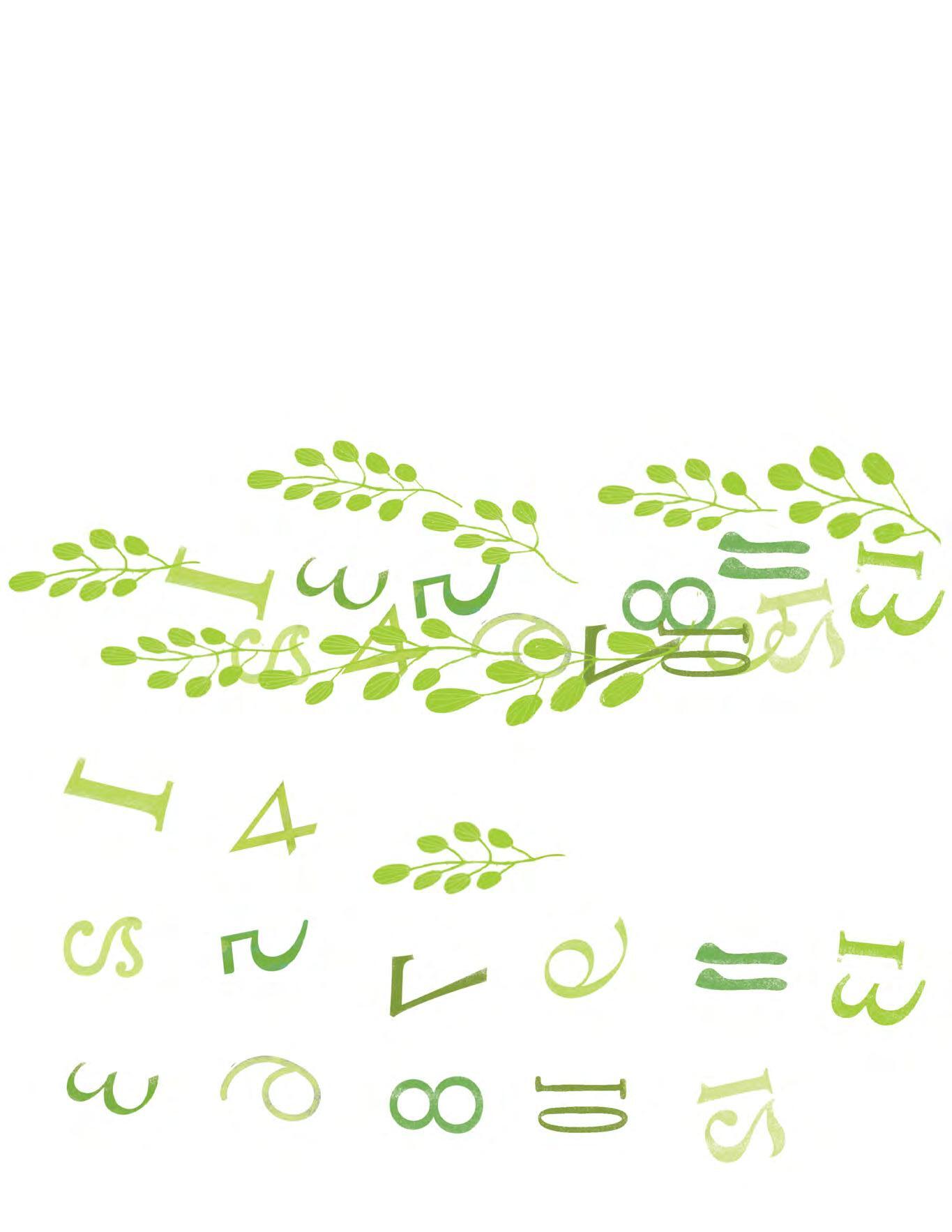



70



Who knows 1? I know 1! 1 is our God – in heaven and on earth!
Who knows 2? I know 2! 2 are the tablets from Mount Sinai. 1 is our God – in heaven and on earth!
Who knows 4? I know 4! 4 are the founding Mothers [of the Jewish people]. 3 are…

Who knows 3? I know 3! 3 are the founding Fathers [of the Jewish people]. 2 are the tablets from Mount Sinai. 1 is our God –in heaven and on earth!
Who knows 5? I know 5! 5 are the books of the Torah. 4 are…
Who knows 6? I know 6! 6 are the books of the Mishnah. 5 are…
Who knows 7? I know 7! 7 are the days of the week. 6 are….
Who knows 8? I know 8! 8 are the days until brit milah (circumcision). 7 are…
Who knows 9? I know 9! 9 are the months until a baby is born. 8 are…

Who knows 10? I know 10! 10 are the Ten Commandments. 9 are…
Who knows 11? I know 11! 11 are the stars in Joseph’s dream. 10 are…
Who knows 12? I know 12! 12 are the tribes of Israel. 11 are…
Who knows 13? I know 13! 13 are God’s special qualities. 12 are the tribes of Israel. 11 are the stars in Joseph’s dream. 10 are the Ten Commandments. 9 are the months until a baby is born. 8 are the days until brit milah (circumcision). 7 are the days of the week. 6 are the books of the Mishnah. 5 are the books of the Torah. 4 are the founding Mothers. 3 are the founding Fathers. 2 are the tablets from Mount Sinai, and 1 is our God – in heaven and on earth!








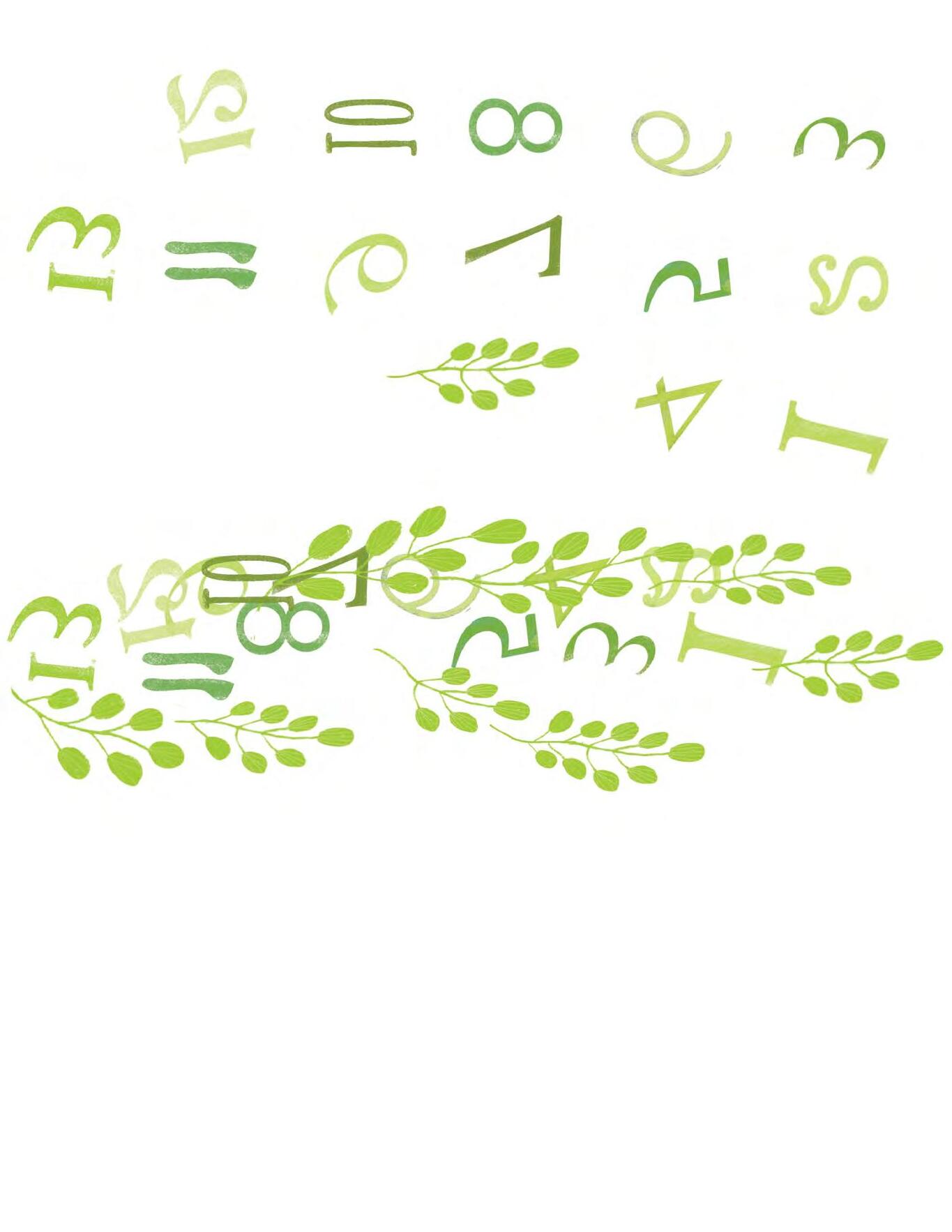


CELEBRATE! 71




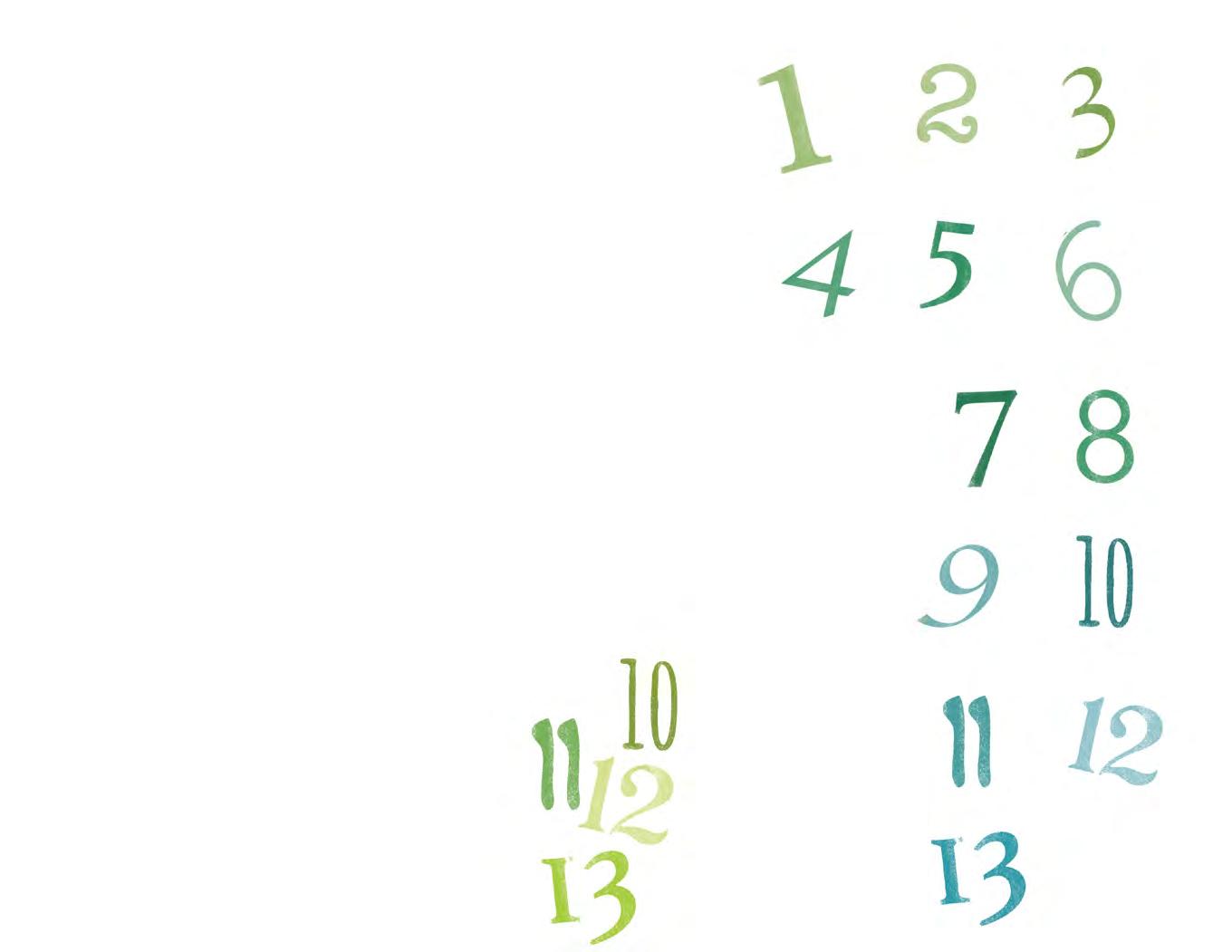
Echad mi yode’a? Echad ani yode’a: echad Eloheinu, shebashamayim uva’aretz.
Shnayim mi yode’a? Shnayim ani yode’a: shnei luchot habrit, echad Eloheinu, shebashamayim uva’aretz.
Shlosha mi yode’a? Shlosha ani yode’a: shlosha avot, shnei luchot habrit, echad Eloheinu, shebashamayim uva’aretz.

Arba mi yode’a? Arba ani yode’a: arba imahot, shlosha avot, shnei luchot habrit, echad Eloheinu, shebashamayim uva’aretz.

Chamisha mi yode’a? Chamisha ani yode’a: chamisha chumshei Torah, arba imahot, shlosha avot, shnei luchot habrit, echad Eloheinu, shebashamayim uva’aretz.
Shisha mi yode’a? Shisha ani yode’a: shisha sidrei Mishnah, chamisha chumshei Torah, arba imahot, shlosha avot, shnei luchot habrit, echad Eloheinu, shebashamayim uva’aretz.
Shiv’a mi yode’a? Shiv’a ani yode’a: shiv’a yemei shabata, shisha sidrei Mishnah, chamisha chumshei Torah, arba imahot, shlosha avot, shnei luchot habrit, echad Eloheinu, shebashamayim uva’aretz.





72







Shmona mi yode’a? Shmona ani yode’a: shmona yemei milah, shiv’a yemei shabata, shisha sidrei Mishnah, chamisha chumshei
Torah, arba imahot, shlosha avot, shnei luchot habrit, echad Eloheinu, shebashamayim uva’aretz.
Tish’a mi yode’a? Tish’a ani yode’a: tish’a yarchei leida, shmona yemei milah, shiv’a yemei shabata, shisha sidrei Mishnah, chamisha chumshei Torah, arba imahot, shlosha avot, shnei luchot habrit, echad Eloheinu, shebashamayim uva’aretz.
Asara mi yode’a? Asara ani yode’a: asara dibraya, tish’a yarchei leida, shmona yemei milah, shiv’a yemei shabata, shisha sidrei Mishnah, chamisha chumshei Torah, arba imahot, shlosha avot, shnei luchot habrit, echad Eloheinu, shebashamayim uva’aretz.

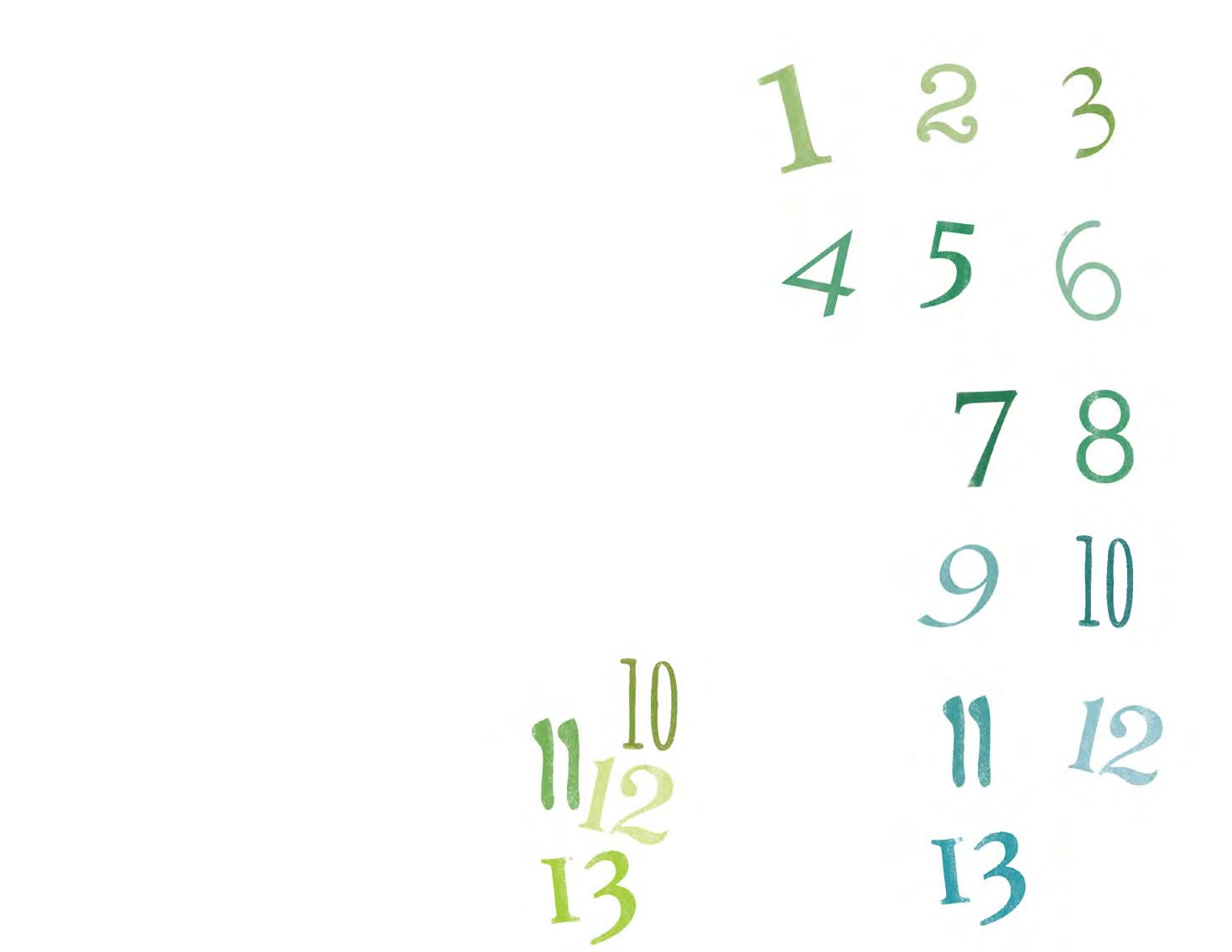

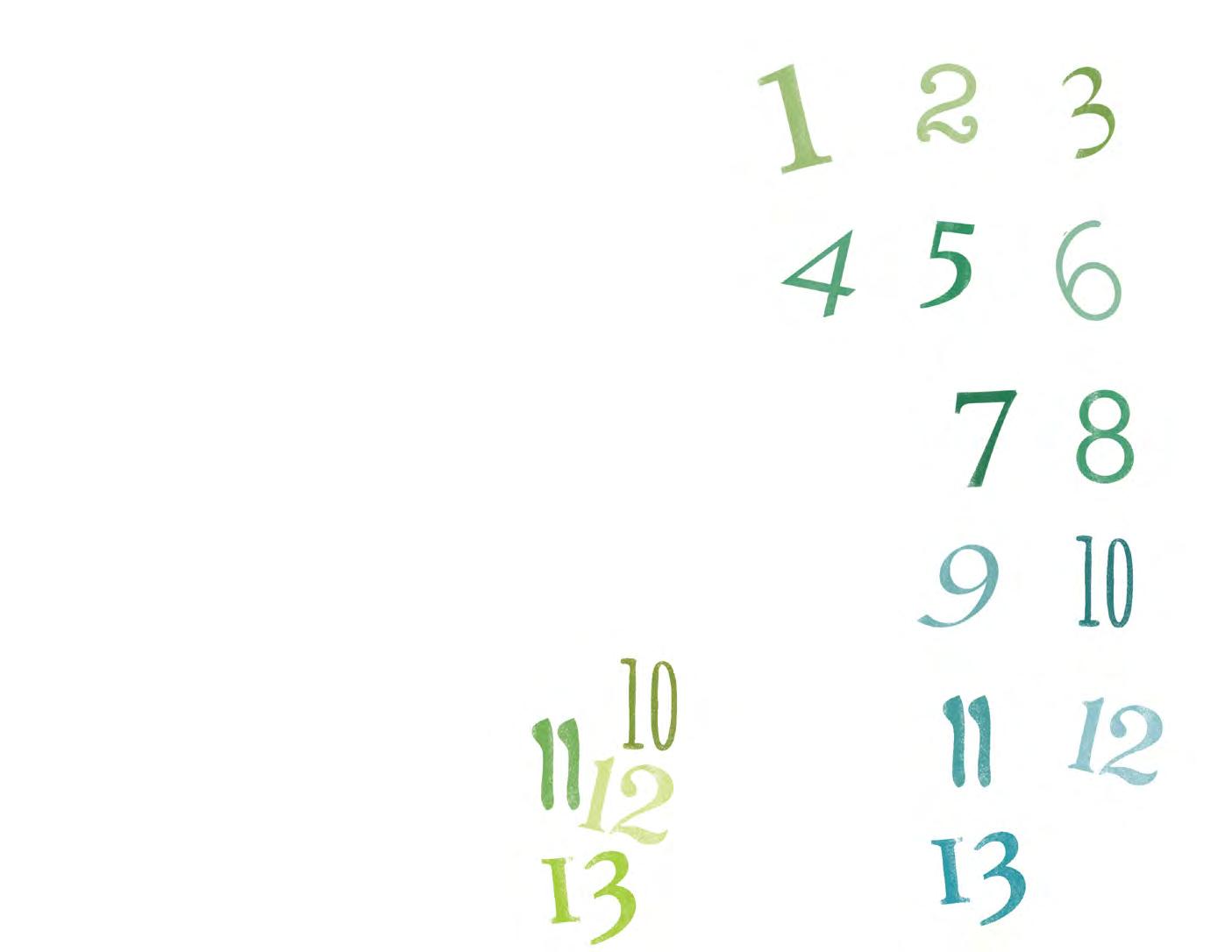
Achad asar mi yode’a? Achad asar ani yode’a: achad asar kochvaya, asara dibraya, tish’a yarchei leida, shmona yemei milah, shiv’a yemei shabata, shisha sidrei Mishnah, chamisha chumshei
Torah, arba imahot, shlosha avot, shnei luchot habrit, echad Eloheinu, shebashamayim uva’aretz.
Shneim asar mi yode’a? Shneim asar ani yode’a: shneim asar shivtaya, achad asar kochvaya, asara dibraya, tish’a yarchei leida, shmona yemei milah, shiv’a yemei shabata, shisha sidrei Mishnah, chamisha chumshei
Torah, arba imahot, shlosha avot, shnei luchot habrit, echad Eloheinu, shebashamayim uva’aretz.
Shlosha asar mi yode’a? Shlosha asar ani yode’a: shlosha asar midaya, shneim asar shivtaya, achad asar kochvaya, asara dibraya, tish’a yarchei leida, shmona yemei milah, shiv’a yemei shabata, shisha sidrei Mishnah, chamisha chumshei
Torah, arba imahot, shlosha avot, shnei luchot habrit, echad Eloheinu, shebashamayim uva’aretz.
CELEBRATE CELEBRATE!
73
CHAD GADYA
Just 0ne Little Goat
This Haggadah has one last song. It’s also a game: a long chase, with one verse after another describing someone chased by someone else stronger, until in the end only God’s power remains. Translation and transliteration on pages 76 and 77.

Let each person at the table choose one character or object from the story and make its noise every time its name comes around while everyone else sings. Your table will get noisier and more dramatic as the verses get longer!
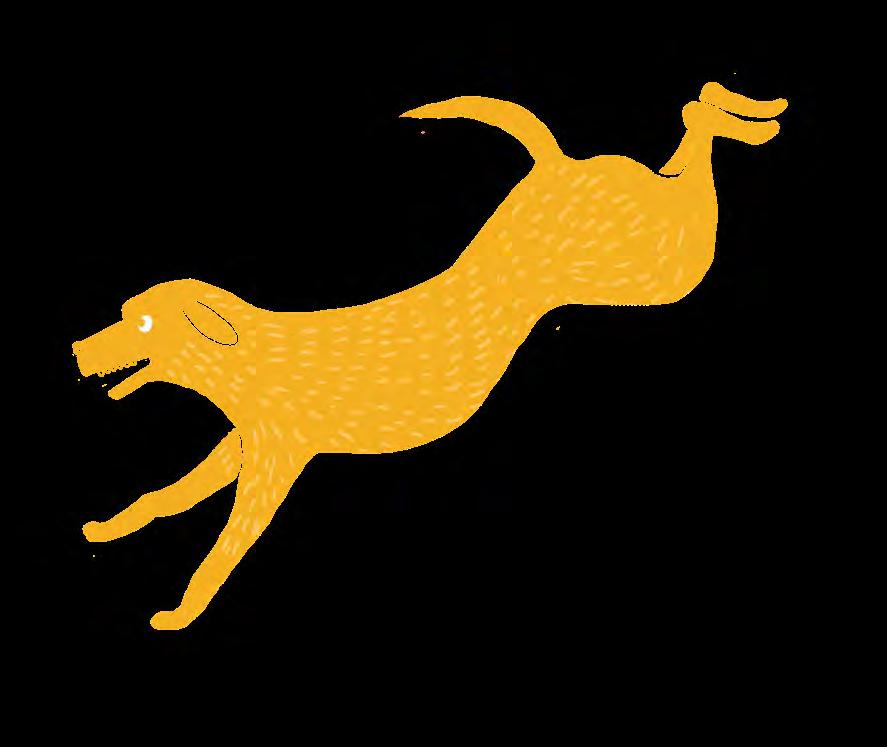






74


אָיְדַגּ דַח ˛יֵזוּז יֵרְתִבּ אָבַּא ןיִבַּז ְדּ
.אָיְדַגּ דַח ˛אָיְדַגּ דַח ˛יֵזוּז יֵרְתִבּ אָבַּא ןיִבַּז ְדּ ˛אָיְדַגְל הָלְכָאְו אָרְנוּשׁ אָתֲאַו ˛אָיְדַגּ דַח ˛יֵזוּז יֵרְתִבּ אָבַּא ןיִבַּז ְדּ ˛אָיְדַגְל הָלְכָאְדּ ˛אָרְנוּשְׁל ַשָׁנְו אָבְּלַכ אָתֲאַו
.אָיְדַגּ דַח אָבַּא ןיִבַּז ְדּ ˛אָיְדַגְל הָלְכָאְדּ ˛אָרְנוּשְׁל ַשָׁנְדּ ˛אָבְּלַכְל הָכִּהְו אָרְטוּח אָתֲאַו .אָיְדַגּ דַח ˛אָיְדַגּ דַח ˛יֵזוּז יֵרְתִבּ ˛אָיְדַגְל



הָלְכָאְדּ ˛אָרְנוּשְׁל ַשָׁנְדּ ˛אָבְּלַכְל הָכִּהְד ˛אָרְטוּחְל ףַרָשְׂו אָרוּנ אָתֲאַו .אָיְדַגּ דַח ˛ א ָיְדַגּ דַח ˛יֵזוּז יֵרְתִבּ אָבַּא ןיִבַּז ְדּ ˛אָרְנוּשְׁל ַשָׁנְדּ ˛אָבְּלַכְל הָכִּהְד ˛אָרְטוּחְל ףַרָשְׂדּ ˛אָרוּנְל הָבָכְו אָיַּמ אָתֲאַו .אָיְדַגּ דַח ˛ א ָיְדַגּ דַח ˛יֵזוּז יֵרְתִבּ אָבַּא ןיִבַּז ְדּ ˛אָיְדַגְל הָלְכָאְדּ ˛אָבְּלַכְל הָכִּהְד ˛אָרְטוּחְל ףַרָשְׂדּ ˛אָרוּנְל הָבָכְדּ ˛אָיַּמְל אָתָשְׁו אָרוֹת אָתֲאַו .אָיְדַגּ דַח ˛ א ָיְדַגּ דַח ˛יֵזוּז יֵרְתִבּ אָבַּא ןיִבַּז ְדּ ˛אָיְדַגְל הָלְכָאְדּ ˛אָרְנוּשְׁל ַשָׁנְדּ הָכִּהְד ˛אָרְטוּחְל ףַרָשְׂדּ ˛אָרוּנְל הָבָכְדּ ˛אָיַּמְל אָתָשְׁדּ ˛אָרוֹתְל טַחָשְׁו טֵחוֹשַׁה אָתֲאַו .אָיְדַגּ דַח ˛אָיְדַגּ דַח ˛יֵזוּז יֵרְתִבּ אָבַּא ןיִבַּז ְדּ ˛אָיְדַגְל הָלְכָאְדּ ˛אָרְנוּשְׁל ַשָׁנְדּ ˛אָבְּלַכְל ˛אָרוּנְל הָבָכְדּ ˛אָיַּמְל אָתָשְׁדּ ˛אָרוֹתְל
ַאְלַמ אָתֲאַו אָבַּא ןיִבַּז ְדּ ˛אָיְדַגְל
˛אָבְּלַכְל הָכִּהְד ˛אָרְטוּחְל ףַרָשְׂדּ
יֵרְתִבּ ˛אָרוֹתְל טַחָשְׁדּ ˛טֵחוֹשְׁל טַחָשְׁ דּ ˛תֶוָמַּה אְלַמְל טַחָשְׁו אוּה וּרָבּ שׁוֹדָקַּה אָתֲאַו ˛אָרְנוּשְׁל ַשָׁנְדּ ˛אָבְּלַכְל הָכִּהְדּ ˛ א ָרְטוּחְל ףַרָשְׂדּ ˛ א ָרוּנְל הָבָכְדּ ˛אָיַּמְל אָתָשְׁדּ .אָיְדַגּ דַח ˛אָיְדַגּ דַח ˛יֵזוּז יֵרְתִבּ אָבַּא ןיִבַּז ְדּ ˛אָיְדַגְל הָלְכָאְדּ
75
טַחָשְׁדּ ˛טֵחוֹשְׁל טַחָשְׁו תֶוָמַּה
הָלְכָאְדּ ˛אָרְנוּשְׁל ַשָׁנְדּ
.אָיְדַגּ דַח ˛ א ָיְדַגּ דַח ˛יֵזוּז
CELEBRATE!

Dezabin abba bitrei zuzei.
Chad gadya, chad gadya!
Va’ata shunra v’achla legadya dezabin abba bitrei zuzei.
Chad gadya, chad gadya!
Va’ata chalba venashach leshunra, d’achla legadya
dezabin abba bitrei zuzei. Chad gadya, chad gadya!
Va’ata chutra vehika lechalba, denashach leshunra, d’achla legadya dezabin abba bitrei zuzei. Chad gadya, chad gadya!
Va’ata nura vesaraf lechutra, dehika lechalba, denashach leshunra, d’achla legadya dezabin abba bitrei zuzei. Chad gadya, chad gadya!
Va’ata maya vechava lenura, desaraf lechutra, dehika lechalba, denashach leshunra, d’achla legadya dezabin abba bitrei zuzei.
Chad gadya, chad gadya!
Va’ata tora veshata lemaya, dechava lenura, desaraf lechutra, dehika lechalba, denashach leshunra, d’achla legadya dezabin abba bitrei zuzei. Chad gadya, chad gadya!
Va’ata hashochet veshachat letora, deshata lemaya, dechava lenura, desaraf lechutra, dehika lechalba, denashach leshunra, d’achla legadya dezabin abba bitrei zuzei. Chad gadya, chad gadya!
Va’ata malach hamavet veshachat leshochet, deshachat letora, deshata lemaya, dechava lenura, desaraf lechutra, dehika lechalba, denashach leshunra, d’achla legadya dezabin abba bitrei zuzei. Chad gadya, chad gadya!
Va’ata haKadosh Baruch Hu veshachat lemalach hamavet, deshachat leshochet, deshachat letora, deshata lemaya, dechava lenura, desaraf lechutra, dehika lechalba, denashach leshunra, d’achla legadya dezabin abba bitrei zuzei. Chad gadya, chad gadya!





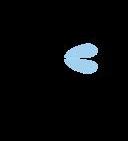



76


My father bought it for just two coins. One little goat, one little goat!
Then the cat came and ate the goat that my father bought for just two coins. One little goat, one little goat!
Then the dog came and bit the cat that ate the goat that my father bought for just two coins. One little goat, one little goat!
Then the stick came and hit the dog that bit the cat that ate the goat that my father bought for just two coins. One little goat, one little goat!
Then the fire came and burned the stick that hit the dog that bit the cat that ate the goat that my father bought for just two coins. One little goat, one little goat!
Then the water came and put out the fire that burned the stick that hit the dog that bit the cat that ate the goat that my father bought for just two coins. One little goat, one little goat!
Then the ox came and drank the water that put out the fire that burned the stick that hit the dog that bit the cat that ate the goat that my father bought for just two coins. One little goat, one little goat!
Then the butcher came and slaughtered the ox that drank the water that put out the fire that burned the stick that hit the dog that bit the cat that ate the goat that my father bought for just two coins. One little goat, one little goat!

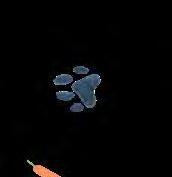
Then the Angel of Death came and killed the butcher that slaughtered the ox that drank the water that put out the fire that burned the stick that hit the dog that bit the cat that ate the goat that my father bought for just two coins. One little goat, one little goat!
Then God came and defeated the Angel of Death that killed the butcher that slaughtered the ox that drank the water that put out the fire that burned the stick that hit the dog that bit the cat that ate the goat that my father bought for just two coins. One little goat, one little goat!
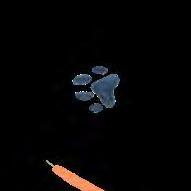








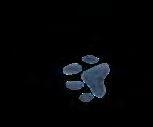
CELEBRATE! 77
NEXT YEAR IN JERUSALEM
J E RU S A L E M
Everyone reads together:
We began the seder as slaves tasting salty tears. Then we raced through the desert sand and ate matzah baked in a hurry. We passed through the Sea of Reeds and escaped from Pharaoh’s army. We praised God for helping us escape and saving our lives.
Our job of remembering and re-living this amazing adventure is now complete. We have finished our seder and told our story of freedom.
We now move from the past to the future.
How will I grow this year? How will the world change? How can we keep moving from slavery to freedom?
The Haggadah ends with great hope for the future:
Leshana haba’a biYerushalayim!
Next year in Jerusalem! Next year may all people be free!
הָאָבַּה הָנָשְׁל
!םִיָֽלָשׁוּריִבּ
78
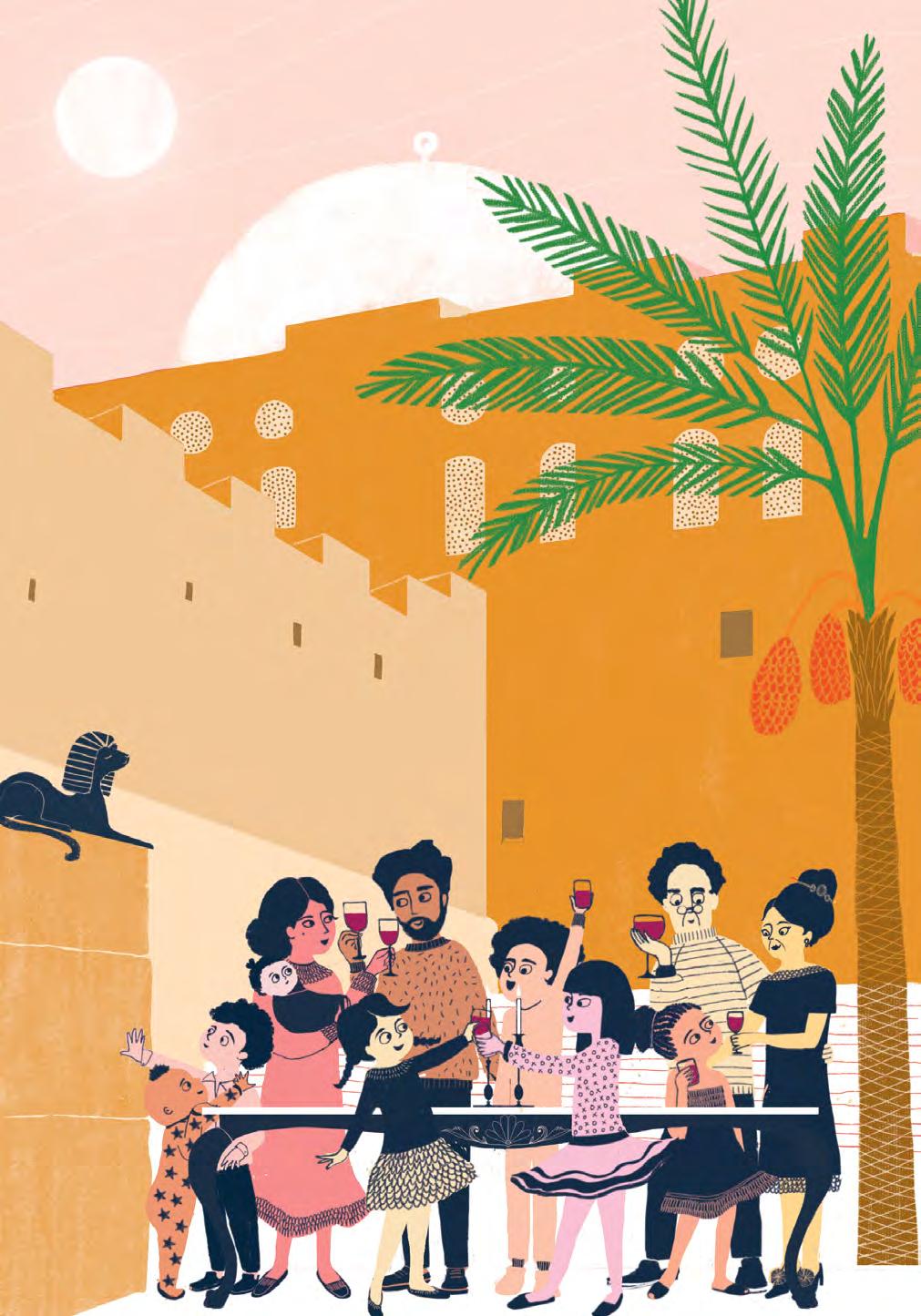
79
In every generation we should see ourselves as if we personally came out of Egypt.
Shalom! Because this book has Hebrew, which is read from right to left, we start at the other end. Flip to the other side to get started.
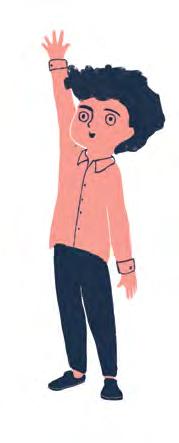


80

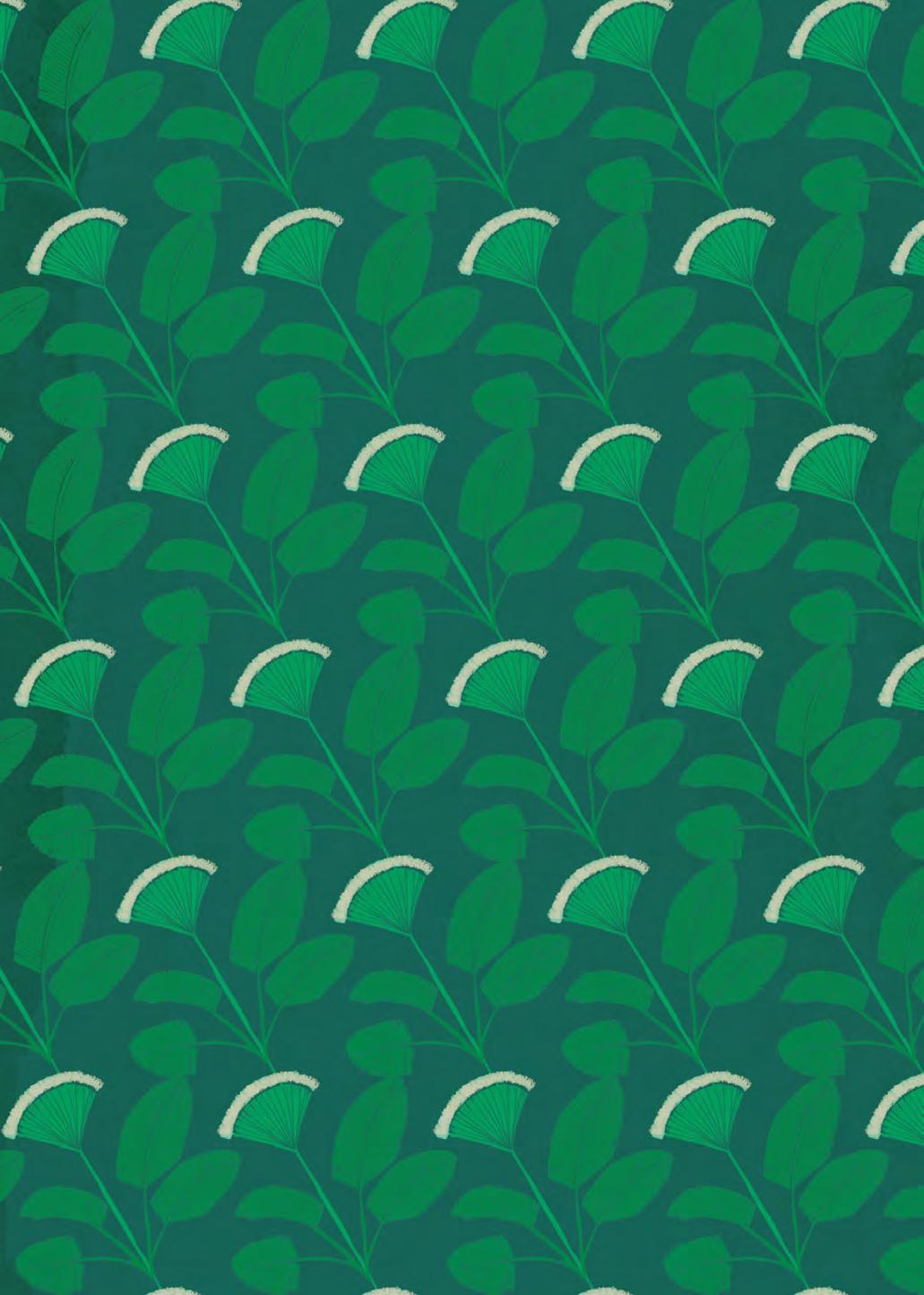

CREATED BY

$7.99
ISBN 978-1-7343450-2-5
50799 >
9781734345025
and provided in the Heart of NJ by
PJLIBRARY.ORG/PASSOVER PJ Library is funded


























































































































































































































